


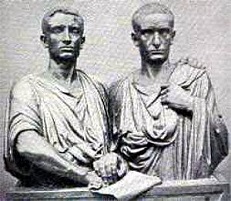







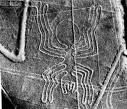
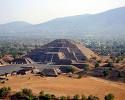
-200 World pop.: 150M-230M. The 145th Olympiad. Roman consuls: Publius Sulpicius Galba and Gaius Aurelius Cotta. Seleucid king Antiochus III of Syria wins the Battle of Panion (Panium) (Paneas) (named after the Greek god Pan) at the foot of Mt. Hermon N of the Golan Heights at the source of the Banias River, chasing the Ptolemies out of the Holy Land (Palestine and S Syria), then seizes Coele-Syria and most of S Asia Minor except Cyprus; the Fifth Syrian War (begun -202) ends after Ptolemy V agrees to marry Antiochus II's daughter Cleopatra I; he doesn't give up his claim to Syria but ends up being assassinated in -180 before he can do anything about it? The Second Macedonian War begins (ends -196) when Philip V refuses a Roman ultimatum to stop attacking Rhodes and Pergamon in Asia Minor, and many Greek states join Rome against him; Attica is ravaged. About this time lead pipe suddenly begins replacing stone and wood aqueducts in Rome. About this time Perigeux (Périgueux) in SW France (modern-day Dordogne, Nouvelle-Aquitaine) is settled by the Petrocorii ("four tribes") from the N, who also establish a camp at La Boissiere until a Roman invasion causes them to flee to the Plain of L'Isle and found the town of Vesunna, leaving Perigeux to the Romans, who Romanize it with ramparts, baths, temples, amphitheatres, and a forum, renaming it Cititas Petrocoriorum by 300 C.E. In this cent. the Indo-European-speaking Venedi (Slavs) inhabit the region SE of the Vistula River and NE of the Carpathian Mts. in the upper basin of the W Bug, Pripet, and Dniester (Dnestr) Rivers, expanding in all directions, eventually (6th cent. C.E.) forming the W Slavs (Czechs, Poles, Slovaks, Moravians), S Slavs (Bulgarians, Serbs, Croats, Slovenes), and E Slavs (Russians, who subdivide into the Great Russians, Little Russians or Ukrainians, and the White Russians or Belorussians). In this cent. the Celtic Helvetii inhabit the W part of Switzerland from the Rhone to the Rhine Rivers, E of the Jura Mts., with capital at Aventicum (modern-day Avenches); Caesar calls them the bravest of the Gallic peoples. About this time the Hypsistarians, who worship the Most High God arise in Greece and Asia Minor (until 400 C.E.); they become gentile wannabe Jews? In this cent. the Moche Culture is founded in the dry deserts of N coastal Peru (until 700), growing maize and cotton, ruled by a wealthy elite dominated by warrior-priests, and becoming the first Am. aborigines to master metallurgy (gold and copper); large irrigation systems, temples, and platforms are built, and royal tombs are built in Sipan (excavated in 1987), incl. a Temple of the Sun (Huaca del Sol) (largest pyramid in the Americas), and Temple of the Moon (Huaca de la Luna) decorated with grotesque images of sacrificial torture-deaths, incl. birds eating living people, crude face lifts for tearing off faces, and other disturbing images; the real thing is done at a nearby site, making the images the first known use of art as documentary? In this cent. the city of Teotihuacan (Teotihuacán) (Nathuatl "birthplace of the gods") is founded in the Valley of Mexico, with a master building plan that is used for the next 6 cents.; the Mexican Sun temple Atetello is built. In this cent. the Nazca Lines (700 C.E.?) on the Pampas de Jumana in Peru are created, featuring drawings of gigantic spiders and other f igures that can only be discerned from high in the air. Potatoes are first grown by the Incas of Peru, Bolivia, and Chile. In this cent. the Iron Age reaches Ulster; agriculture declines for the next four cents. in Ireland. About this time the fair-complected red-haired green-eyed nomadic Turkic Kyrgyz (Kirghiz) (Kyrghyz) ("40 Tribes") people inhabit W Mongolia. In this cent. in the reign (-188 to -141) of Han Dynasty emperor Liu Qi, tea is traded by land over the Silk Road, causing the word "chai" for tea to spread; when the Dutch begin trading tea between Asia and Europe by sea in the 17th cent. C.E., they spread the word "tea". Emperor Han Gao Zu of China makes Chang'an (Changan) in Shaanxi Province near Xi'An at the E terminal of the Silk Road his capital. About this time Roman senator-historian ("the Founder of Historiography") Quintus Fabius Pictor, who fought the Gauls in -225 and also fought in the Second Punic War (-218 to -201), and visited the oracle in Delphi for advice after the defeat at the Battle of Cannae in -216 flourishes, writing a history of the Second Punic War in Greek using Olympiad dating and a Hellenistic style, becoming the first Roman annalist, starting the "ab urbe condita" (from the founding of the city) tradition, making use of the work of Greek historian Diocles of Peparethus, and used as a source by Polybius, Plutarch, Livy, and Dionysius of Halicarnassus; too bad, he is heavily biased on the Roman side, churning out propaganda, as mentioned by Polybius; he dates the founding of Rome as "the first year of the 8th Olympiad", i.e., 747 B.C.E. This cent. is the Golden Age of Roman Drama; too bad, the only plays to survive are 20 by Plautus and six by Terence, all of them fabulae palliatae, comedies based on Greek originals. In this cent. the Etrurian city of Fescennia (Fescennium) N of modern-day Corchiano in C Italy becomes known for vulgar, obscene, and scurrilous verse, causing the term "Fescennine" to be coined - wouldn't you be if you had all them Romans on your butt all the time? About this time the Bichon Frise (Fr. "curly lap dog") dog breed is developed in Spain from the barbet (water spaniel), becoming popular with royalty. Architecture: In this cent. the Ajanta Caves near Bombay, India begin to be richly carved and decorated by Buddhist monks, who use them as temples (until 600 C.E.). Inventions: In this cent. the Romans begin using wax tablets for writing. In this cent. the ox-driven water wheel for irrigation is invented. In this cent. the Carnyx bronx trumpet with an elongated S shape and an open-mouthed boar's or serpent's head bell is produced by the Celts (until 200 C.E.). In this cent. the Batteries of Baghdad are built; used for electroplating? About this time the saddle tree is invented in Asia, a felt-covered wooden frame that redistributes the rider's weight to keep the horse's back from getting sore, without which stirrups won't work. Science: About this time Egyptian-born Greek big brain Eratosthenes of Cyrene (-276 to -194) (head librarian of the Library of Alexandria) determines the circumference of the Earth by measuring noon Sun angles in wells at Syene (Aswan) and Alexandria, coming within 50 mi. of the correct value (approx. 25K mi.), suggesting that the Sun moves around the Earth; he also measures the obliquity of the ecliptic with an error of 7 min. of arc, and maps the course of the Nile River; the southernmost point of Africa is considered the Horn of Africa, taking the Greeks and Romans until the 1st cent. C.E. to discover SE Africa; it takes until 1670 C.E. for Christian Europe to catch back up? In this cent. Illyrian king Gentius allegedly discovers the medicinal (anti-dyspeptic) properties of the gentian (genius Gentiana) plants, found only in high mountain meadows and pastures, with blue or yellow flowers - Ricola? Nonfiction: In this cent. the Apocryphal Book of Tobit (Tobias), Wisdom of Solomon, Book of Baruch, Four Books of Maccabees are probably written, along with Ecclesiasticus (Sirach) by Ben Sira, son of Joshua (Joshua) (Yeshua) (Jesus) ben Sirach, which becomes the earliest witness to a canon of the Jewish books of the Prophets. In this cent. the Hebrew scriptures begin to be trans. into Aramaic, becoming known as the Targumim. In this cent. Greek soothsayer Artemidorus Daldianus (Ephesius) thrives, leaving the 5-vol. Greek work Oneirocritica (The Interpretation of Dreams); not to be confused with the dude who gave Caesar a warning note in -44. In this cent. Greek astronomer Theodosius of Tripolis flourishes, leaving works on the geometry of the surface of a sphere et al. In this cent. Indian guru Patanjali flourishes, compiling the 196 Yoga Sutras, the foundational work of classical (Kundalini?) Yoga. In this cent. the 700-verse Sanskrit Bhagavad Gita (Sans. "Song of the Adorable One") is written, becoming the 6th part of the "Mahabharata"; master archer Arjuna (Sans. "silver, shining") is persuaded by charioteer Lord Krishna to take part in the war between the Pandavas and Kauravas, and kills his unknown brother Karna of the Kauravas. Births: Greek Peripatetic philosopher Critolaus of Phaselis (d. -118); student of Aristo of Ceos.
-199 Ephesus passes to the kings of Pergamon. The Leges Porciae (Porcian Laws), a series of laws granting Roman citizens rights to appeal in capital cases, plus other protections begin to be passed (ends -184). Roman consuls: Lucius Cornelius Lentulus and Publius Villius Tappulus.

-198 Roman consuls: Sextus Aelius Paetus and Titus Quinctius Flamininus. 30-y.-o. Roman gen. Titus Quinctius Flamininus (-228 to -174) is elected consul despite being younger than the constitutional min., and is chosen to replace Publius Sulpicius Galba as CIC of Roman forces for the Second Macedonian War, and he goes on to chase Philip V of Macedon out of most of Greece, then defeat him on June 24 at the Battle of the Aous near modern-day Tepelene, Albania; to keep him from making a quick peace because his consulship is ending, Flamininus is made proconsul to finish the war. Syria becomes part of the Seleucid Empire, and Palestine reverts to Syria; Egypt is out of the Judean picture. Sparta under King Nabis acquires Argos, pissing off the Achaean League, which allies with Rome, and together they set out to conquer the entire Peloponnesus and force Sparta and Messene to join.

-197 The Romans under proconsul Titus Quinctius Flamininus in alliance with the Aetolian League defeat Philip V of Macedonia at the Battle of Cynoscephalae (Dog's Head) in Thessaly between Thermopylae and Pydna, utterly defeating the once-proud Macedonian army and ending its threat in Asia Minor; the Macedonian phalanx holds the Roman legions back until 20 maniples fall upon their rear after the Roman elephants rout the left flank; Flamininus goes on to direct the political affairs of the Greek states from Elateia until -194. Attalus I dies, and Eumenes II Soter ("savior") (-197 to -159) becomes king of Pergamon (Pergamum) (Pergamos) in W Asia Minor, expanding the Library of Pergamon, building the #2 library in the world after Alexandria (200K vols.), improving the preparation of parchment, also building a great altar to Zeus; Antiochus III begins campaigning in Asia Minor and Thrace, conquering the S coast of Asia Minor and making Ephesus his second capital, which causes Eumenes II to complain to Rome. The Romans establish the province of Hispania Citerior (Nearer Spain) along the E coast (modern-day Valencia, Catalonia, Aragon), with capital at Tarraco (modern-day Tarragona), and Hispania Ulterior (Further Spain) in the S (modern-day Andalusia), with capital at Curdoba (modern-day Cordoba), sparking the Iberian Revolt (ends -195); the Romans put down a revolt of the Celtic Turdetani tribe in the Baetis (modern-day Guadalquivir) River Valley in S Farther Spain (Hispania Ulterior), along with other rebel tribes in Nearer Spain (Hispania Citerior), giving them control of a band along the S and E coasts. The seaport of Salernum (modern-day Salerno) (modern-day pop. 133K) in SW Italy on the Gulf of Salerno (29 mi. ESE of Naples) is founded by the Romans. Roman consuls: Gaius Cornelius Cethegus and Quintus Minucius Rufus.

-196 The 146th Olympiad. Okay, bend over and close your eyes? In July Greek-speaking Roman gen. Titus Quinctius Flamininus, the man who kicked Philip V's Macedonian butt gives a memorable Speech at the Isthmian Games in Corinth, proclaiming the "freedom of the Greeks", which causes him to become a great hero to the dumb blondes, and gets his mug engraved on coins, plus deification in some Greek cities; in reality Rome is assuming the protectorate of the Greek states, and is mainly backing the liberty of the aristocrats; the Second Macedonian War (begun -200) ends with Philip V forced to relinquish his conquered Greek cities, surrender his fleet, and pay a 1K-talent indemnity, but his kingdom is left intact as a buffer state between Greece and Illyria, pissing off the Achaean League; Macedonia becomes a Roman ally subject to Roman control of foreign affairs; on the way back to Rome Flamin' Flamininus plunders Sparta and returns with 1.2K freed slaves who had been taken captive in the Second Punic War. Roman praetor Marcus Acilius Glabrio suppresses a slave revolt in Etruria. The Etruscan city of Felsima (modern-day Bologna) is conquered by the Gallic Boii. The black basalt Rosetta Stone is cut, containing parallel texts in Egyptian Hieroglyphics, Egyptian Demotic, and Greek, celebrating the coronation of Ptolemy V Epiphanes, who is married to Cleopatra I, daughter of Antiochus II; discovered in July 1799 by the French under Napoleon. Roman consuls: Lucius Furius Pupurio and Marcus Claudius Marcellus.

-195 Roman consuls: Lucius Valerius Flaccus and Marcus Porcius Cato the Elder. Marcus Porcius Cato the Elder (-234 to -149) becomes Roman consul, and is given command of the whole pesky Spanish peninsula, putting down a rebellion in the NW and lower Ebro River Valley before taking on the Turdetani and Celtiberian tribes in the S. Ptolemy V Epiphanes comes of age, and suppresses the native revolts. Sparta loses Argos and much of Laconia, and is placed under the supervision of the Achaean League. After his war preparations piss-off the Romans, causing them to demand his surrender, Hannibal flees to Asia to the court of Antiochus III the Great of Syria - yo, Adrian?
-194 Roman consuls: Publius Cornelius Scipio Africanus the Elder and Tiberius Sempronius Longus. All Roman forces leave Greece. Marcus Porcius Cato returns to Rome, leaving two praetors in charge of Farther and Nearer Spain; too bad, the pesky native tribes keep rebelling for the next 175 years; meanwhile an incursion of Lusitanians (Lusitani) on the Betis Valley is checked by the troops of Scipio Nasica - guys that sweat a lot need a backup plan? After Eumenes II appeals to Rome for help against Seleucid king Antiochus III, Rome agrees to resolve Pergamon's dispute with Syria. Pozzuoli (on the Bay of Naples) becomes a Roman colony. Han Gao Zu (Liu Bang) dies, and weak 17-y.-o. Han Hui Di (-211 to -188) becomes Xi Han emperor #3 of China (until -188); Queen Han Lu Hou takes over the admin., and kills Prince Zho (Zhao) and his concubine Qi. The best places in Roman theaters are given to the senators. Births: Roman comic playwright Publius Terentius Afer (Terence) (d. -159) in Carthage; actor Lucius Ambivius Turpio performs in all of his plays. Deaths: Greek #1 scientist Eratosthenes of Cyrene (b. -276); becomes blind, then starves himself to death; leaves a Map of the World from his researches in the great library of Alexandria.
-193 Roman consuls: Lucius Cornelius Merula and Quintus Minucius Thermus. The Celtic Boii of the Po Valley are defeated by the Romans under consul Lucius Cornelius Merula in the Battle of Mutina (near modern-day Modena) in N Italy, losing their capital of Bononia (Bologna), after which a large portion of them leave Italy and head back to Bohemia; too bad, since the V cost the Romans too much, the Senate refuses Merula a triumph; Bononia is later resettled by 3K families led by consuls Lucius Valerius Flaccus, Marcus Atilius Seranus, and Lucius Valerius Tappo, becoming one of the leading Roman cities. The Celtic (Cimbri?) Lusitani (Lusitanians) (Belitanians) tribal confederation in W coastal Spain between the Douro and Tagus Rivers (known for their women warriors) begin resisting the Romans. Architecture: The Porticus Aemilia, a warehouse in Rome's new dockyards is built S of the Aventine Hill by Marcus Aemilius Lepidus and Lucius Aemilius Paulus, becoming the first use of Concrete, based on pozzolana, volcanic stone mortar from the new Roman colony of Pozzuoli in the Bay of Naples (two parts pozzolana to one part lime); the addition of seawater makes it stronger over time?
-192 The 147th Olympiad. Roman consuls: Lucius Quinctius Flaminius (d. -170) and Gnaeus Domitius Ahenobarbus. After gen. Titus Quinctius Flamininus goes to Syria to negotiate with Antiochus III, telling him not to interfere with the Greek states, and is told to fork off (Antiochus will leave Greece alone only if Roman does ditto), Antiochus III (aided by Hannibal) crosses over to Greece to aid the Aetolians, causing Rome to declare war (ends -189). King Nabis is assassinated, and Laconicus becomes the last (Eurypontid) king of Sparta; the Spartans are forced into the Achaean League by Rome, and begin to vanish from history, but first they must fight another war with Rome?; Messene and Elis join the Achaean League, giving it control of the entire Peloponnesus. The Aetolians declare war on Rome, and Antiochus III sends a small force to aid them, while the Achaeans and Macedonia support Rome.
-191 Roman consuls: Publius Cornelius Scipio Nasica and Manius Acilius Glabrio. The Romans under gens. Manius Acilius Glabrio and Flamininus defeat Antiochus III at the Battle of Thermopylae on the border between Thessaly and Boeotia, and send him back to Asia; Glabrio begins operations against the Assholians, er, Aetolians. Rome conquers Cisalpine Gaul, leaving the Celts with Transalpine Gaul - they fought for their free-ee-dom? The Roman calendar, which is 4 mo. ahead of the seasons is adjusted. Arsaces II dies, and in 185 Arsaces III Phriapatius (Priapatius) (d. -170) becomes king #3 of Parthia (until -170). Emperor Hui Dui ends the ban on the works of Confucius(begun in -213) - no Huey and Duey for Youey? Plays: Plautus (-254 to -184), Pseudolus; debuts at the Megalesian Festival.


-190 Roman consuls: Lucius Cornelius Scipio Asiaticus and Gaius Laelius. A Seleucid fleet led by Hannibal is defeated by a Rhodian fleet (allied with the Romans) at the Battle of the Eurymedon River. Antiochus III's Syrian fleet is defeated at the naval Battle of Myonnesus, after which in Dec. the Romans under Lucius Cornelius Scipio Asiaticus, brother of Publius Cornelius Scipio Africanus (who serves as his legate) become the first Roman army to invade Asia Minor, defeating the great composite army led personally by Antiochus III at the Battle of Magnesia (between Pergamon and Ephesus in W Lydia), which bankrupts and crushes Syria; the Aetolian League's power vanishes because it had allied with him; Lucius Cornelius Scipio is awarded the surname Asiaticus; after being captured by pirates in -192, Antiochus III of Syria releases Lucius Cornelius Scipio, youngest son of Scipio Africanus Major without ransom before the Battle of Magnesia, causing him trouble with the Senate in -188. Glabro celebrates his triumph against the Macedonians, then runs for censor but withdraws after accusations of embezzlement. Whiny Eumenes II of Pergamon gains control of Ephesus, and it remains in Pergamene control until -133. The defeat of Antiochus III allows Bactrian king Euthydemus and his son Demetrius to begin expanding into the Indus Valley. Pantaleon becomes Greek king of Bactria and India (until -180), becoming the first Greek king to strike Indian coins. Maadikarib Raydan (d. -175) becomes the last king of Haram in S Arabia. Aristo of Ceos (b. ?) dies, and his pupil Critolaus of Phaselis (-200 to -118) becomes dir. #5 of the Lyceum in Athens. The Hellenistic city of Hierapolis in Phrygia in SW Asia Minor is founded by Pergamon king (since -197) Eumenes II on the site of a hot springs, becoming a spa and retirement site. Art: About this time the Winged Victory of Samothrace is carved for the prow of a ship (by Pythokrotos of Lindos?); rediscovered in Apr. 1863 C.E. by French amateur archeologist Charles Champoiseau. Births: Greek #1 astronomer (founder of trigonometery) Hipparchus of Nicaea (d. -120) in Nicaea, Bithynia (modern-day Iznik, Turkey); discoverer of the precession of the equinoxes by observing the bright star Spica in Virgo. Deaths: Greek mathematician Apollonius of Perga (b. -262).
-189 Roman consuls: Marcus Fulvius Nobilior and Gnaeus Manlius Vulso. Exorbitant taxes cause insurrections in Upper Egypt. Roman consul (praetor in -193)Marcus Fulvius Nobilior breaks the power of the Aetolian League and makes the Aetolians into subject allies of Rome, celebrating a magnificent triumph; poet Ennius accompanies him, writing a play about the capture of Ambracia, pissing-off Cato the Censor, who accuses him of compromising the dignity of a Roman gen.; Nobilior goes on to become a fan of Greek art and culture, introducing many masterpieces into Rome incl. The Muses by Zeuxis of Ambracia.

-188 The 148th Olympiad. Roman consuls: Marcus Valerius Messala and Gaius Livius Salinator. The Peace (Treaty) of Apamea causes Antiochus III to pay a large indemnity and surrender his fleet along with Asia Minor, which is divided between Pergamon and Rhodes; Armenia (under Artaxias) and Bactria begin to break away; Antiochus III agrees to turn over Hannibal, but he flees again to the protection of Prusias I Chlorus of Bithynia; Antiochus III's ally Ariarathes IV of Cappadocia obtains favorable peace terms because his daughter Stratonice is betrothed to Roman ally Eumenes II of Pergamon. The jealous Roman Senate, egged on by Marcus Porcius Cato the Censor eggs on two tribunes to prosecute Lucius Cornelius Scipio Asiaticus of misappropriating moneys from Antiochus, and his bro' Scipio Africanus the Elder defends him by tearing up his ledgers and flinging them in the senators' faces, reminding them that his bro' had paid 200K sesterces into the treasury, and crying that they were trying to frame him; nevertheless they go on and prosecute and condemn him, confiscate his property, and try to throw him in prison, which Africanus answers by rescuing him by force. The Spartans revolt and are conquered by the Achaean League under Greek gen. ("the last of the Greeks") Philopoemen (-253 to -183), "the last of the Greeks". Han Hui Di (b. -211) dies, and Han Lu Hou (d. -179) becomes Xi Han emperor #4 of China; Queen Lu Hou stays in charge of the admin., and appoints Chen Ping and Shen Shi Qi as her left and right ministers.

-187 Roman consuls: Marcus Aemilius Lepidus and Gaius Flaminius; Tiberius Sempronius Gracchus III (Major) (-210 to -151), who served on Scipio Africanus' staff in Greece in -190 becomes tribunus plebis (tribune of the people). Antiochus III dies, and his son Seleucus IV Philopater (Philopator) ("father-lover") (-222 to -175) becomes king of Syria (until -175), going on to slowly rebuild its strength. Eumenes II of Pergamon begins a war with Prusias I of Bithynia (ends -183). Reuthra (Rewthra) (d. -173) becomes king of Scotland. Architecture: The Aemilian Road (Way) (Via Aemilia) in NC Italy is built by consul Marcus Aemilius Lepidus, running from Ariminum (Rimini) NW to Placentia (Piacenzia), and later extended across the Po River to Mediolanus (Milan), also to Augusta Praetoria, Segusio, and Aquileia; the Via Flaminia from Rome connects with it at Ariminum. Births: Syrian king Demtrius I Soter (d. -150); son of Seleucus IV Philopater. Greek Stoic philosopher Panaetius of Rhodes (d. -109); mellows Stoicism up into Middle Stoicism.
-186 The Roman Senate investigates and outlaws the cult of Bacchus and the festival of Bacchanalia, associated with those wild tattooed warlike Thracians with dyed hair. Roman consuls: Spurius Postumius Albinus and Quintus Marcius Philippus.
-185 Roman consuls: Appius Claudius Pulcher and Marcus Sempronius Tuditanus. Publius Cornelius Scipio Africanus the Elder is accused of a slew of charges by tribune Marcus Naevius, but on Oct. 18 launches into a eulogy of his achievements on the first day of his trial, then on the 2nd day reminds the good citizens that it is the anniv. of the Battle of Zama, and summons them to follow him to the Capitol to give thanks to the gods and pray that Rome might never lack citizens like himself, which kills the trial; he then passes up the chance to become the first Caesar (dictator for life perhaps?), and beats a strategic retreat into voluntary exile to his country seat at Liternum in Campania. About this year after assassinating the last Mauryan emperor Brihadratha Maura, the Shunga Empire in E-C India (ends -75) is established by Brahmanist About this year Maurya gen. Pushyamitra Shunga (-185 to -149), with capital at Pataliputra; he goes on to cruelly persecute Buddhist monks while performing numerous Ashvamedha (kill or capture my accompanied wandering horse) campaigns to legitimize his rule; the empire goes on to persecute Buddhists and give a big V to the Brahmin priests of Hinduism (named after the Indus River), who ingrain the caste system so deeply that nobody can ever get rid of it? - you stink? Births: Greek Seleucid emperor (-161 to -150) Demetrius I Soter (Gr. "savior") (d. -150); son of Antiochus V Eupator and Laodice IV; husband of Laodice V. father of Demetrius II Nicator and Antiochus VII Sidetes. Roman gen.-statesman Scipio Africanus the Younger (Publius Cornelius Scipio Aemilianus Africanus Numantinus) (d. -129); younger son of Lucius Aemilius Paulus Macedonicus; adopted by his kinsman by marriage Publius Cornelius Scipio, son of Scipio Africanus the Elder, becoming his grandson by adoption.
-184 The 149th Olympiad. Roman consuls: Publius Claudius Pulcher and Lucius Porcius Licinus. Philip V of Macedonia, after reorganizing his finances, opening mines, and defending his N frontiers gets tired of Roman interference based on phony complaints by neighboring states, causing him to go paranoid and begin a campaign to extend his power in the Balkans (until -183). Architecture: Basilica Porcia (burns down in -52), the first basilica and courthouse in the Roman Forum is built by Cato the Elder, beginning the "colonnaded" look, with the Basilica Aemilia (built in -179), Basilica Sempronia (built in -169), and Basilica Opimia (built in -121) (near the Temple of Concord) soon following. Deaths: Roman playwright Plautus (b. -254), leaving the play The Menaechmi (The Twin Brothers).

-183 Roman consuls: Marcus Claudius Marcellus and Quintus Fabius Labeo; Lucius Julius Caesar is elected praetor, and assigned the province of Cisalpine Gaul, with the task of preventing the Transalpine Gauls from building on the site of the seaport of Aquileia, (later Algar) at the head of the Adriatic Sea (25 mi. NW of Trieste), where in -181 a Roman colony is founded as a strongly fortified outpost against the Illyrians, becoming the "second Rome", a center of trade between N and S Europe, with its pop. reaching 500K by the 1st cent. C.E.; too bad, Attila the Hun wastes it in 452 C.E., causing its survivors to hightail it to the lagoons and found Venice, and it ends up with a pop. of only 3K by the late 20th cent. Pisa and Parma become Roman colonies. Philopoemen (b. -253) is captured and poisoned to death by Messenian rebels, and is succeeded as strategos of the Achaean League by Callicrates (d. -149), who is subservient to Rome and allows Sparta to get back on its feet. Pergamon wins its war with Bithynia (begun -187), then begins a war with Pharnaces I of Pontus (d. -169), son of Mithridates III (ends -179), allying with Ariarathes IV of Cappadocia; the Romans send Titus Quinctius Flamininus to demand that officially neutral Prusias I of Bithynia capture Hannibal in order to send him to Rome, causing him to commit suicide next year to avoid being taken POW. Mutina (modern-day Modena) in the Po Valley of Italy a few mi. N of the start of the Apennines (orginally founded by the Etruscans) is refounded as a Roman colony and military base by Marcus Aemilius Lepidus. Architecture: The New Clodian Road (Via Clodia Nova) between Lucca and Florence is built by consul Marcus Claudius Marcellus. Deaths: Greek hero Philopoemen (d. -253) in Messene (poisoned); the last real Greek worthy of the name, according to a Roman. Roman gen. Publius Cornelius Scipio Africanus the Elder (b. -236).
-182 Prusias I Chlorus dies, and his son Prusias II Cynegus "the Hunter" (-182 to -149) becomes king #5 of Bithynia. Roman consuls: Gnaeus Baebius Tamphilus and Lucius Aemilius Paullus. Deaths: Carthaginian gen. Hannibal (b. -247); poisons himself in the Bithynian village of Libyssa (modern-day Gebze) in NW ASia Minor
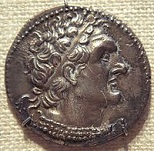
-181 Ptolemy V Epiphanes (b. -210) is assassinated, and his 6-y.-o. son Ptolemy VI Philometor ("loving his mother") (-185 to -145) becomes king #6 of the Egyptian 32nd (Ptolemaic) Dynasty, with his mother Cleopatra I Syra (-204 to -176) as regent. Gracchus III becomes Roman praetor in Spain, going on to bring the wild Celtiberian tribes in C Spain under Roman control. Philip V of Macedonia makes another try to extend his power in the Balkans. Prusias II of Bithynia and Eumenes of Pergamon war with Pharnaces I of Pontus (ends -179). Another "sumptuary law" is passed by the Roman censors to reprimand the obscene consumption of the wealthy. Roman consuls: Publius Cornelius Cethegus and Marcus Baebius Tamphilus.
-180 The 150th Olympiad. The Lex Villia Annalis sets min. ages for Roman magistracies. Bactrian Greeks capture Taxila and Gandhara from the Magadha Kingdom in India. The Etruscan town of Lucca on the Serchio River near the W coast becomes a Roman colony. Roman consuls: Aulus Postumius Albinus and Gaius Calpurnius Piso. Births: Roman politician Publius Licinius Crassus Dives Mucianus (d. -130); son of Publius Mucius Scaevola; brother of Publius Mucius Scaevola (d. -115); adopted by a son of Publius Licinus Crassus Dives (d. -183). Roman satirist (first) Gaius Lucilius (d. -103) in Suessa Aurunca, Compania; becomes friends with Scipio the Younger, serves in the Numantine War (-143 to -134), and becomes a member of the lit. circle of Scipio the Younger; inventor of Roman poetic satire, which is developed by Horace, Persius, and Juvenal.
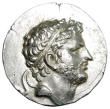
-179 Roman consuls: Quintus Fulvius Flaccus and Lucius Manlius Acidinus Fulvianus. Philip V of Macedonia dies before he can extend his power in the Balkans, and his son Perseus (-212 to -166) becomes the last Antigonid king of Macedonia (until -168); since he had persuaded Philip to execute his pro-Roman brother Demetrius, Eumenes II of Pergamon lays charges against him in Rome, and the handwriting is on the wall? Pergamon wins its war with Pontus (begun -183). Han Lu Hou dies, and after the Lu Clan Extermination, prince of Dai Han Wen Di (Liu Heng) (d. -157) (son of Consort Bo, who has no powerful relatives and is known for humility and thoughtfulness) becomes Xi Han emperor #5 of China, appointing Chen Ping (d. -178) and Zhou Bo (d. -169) as his left and right ministers. Architecture: The Basilica Aemilia in the Roman Forum is built. The Pons Aemilius, the first stone bridge in Rome is begun (finished in -142), later becoming the Ponte Rotto, the oldest Roman stone bridge in Rome. Births: Chinese writer-poet-musician-offical Sima Xiangru (d. -117); developer of the Fu form, which becomes the std. during the Han Dynasty (-206 to 220).
-178 Roman consuls: Marcus Junius Brutus and Aulus Manlius Vulso.
-177 Gracchus III becomes plebeian consul, and crushes a revolt in Sardinia, returning to Rome to celebrate a triumph with a large number of captive (canned?) sardines. Mutina is sacked by the Ligurians, and the Romans go on to rebuild it and turn it into a key center of Cisalpine Gaul on the crossroads between the Via Aemilia and the Via Verona. Roman consuls: Gaius Claudius Pulcher and Tiberius Sempronius Gracchus III.
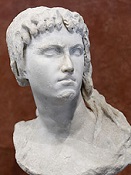
-176 The 151st Olympiad. Cleopatra I dies; Eulaeus and Lenaeus become Ptolemy VI's guardians; his sister Cleopatra II (-185 to -116) becomes his wife, going on to have children Ptolemy Eupator, Cleopatra Thea, Berenice, and Cleopatra III. The Yueh-Chi people of NW China are driven over the Himalayas by the Xiongnu. Roman consuls: Gnaeus Cornelius Scipio Hispallus and Quintus Petillius Spurinus.

-175 Seleucus IV Philopater is murdered by his minister Heliodorus, and his younger brother Antiochus IV Epiphanes ("god manifest") (-215 to -163) becomes king of Syria, soon instituting a policy of "syncretism" which forces all his subjects to abandon their beliefs and customs and become Hellenized, while becoming friendly to Rome; the Jews take it particularly soft, er, hard; Jewish high priest Onias III travels to Antioch to face the accusations of Simon ("listening intently") the Tobiad, overseer of the Jewish temple, only to find out about the change in rule; Onias III is outbid by brother Jason for the position of high priest, and Jason returns to Jerusalem to begin his Hellenization program - if you have a problem with the show, talk to me? Roman consuls: Publius Mucius Scaevola and Marcus Aemilius Lepidus.
-174 Roman consuls: Spurius Postumius Albinus Paullulus and Quintus Mucius Scaevola. Deaths: Roman Gen. Titus Quinctius Flaminius. Hun founder Maodun (b. ?).
-173 After Cato the Elder criticizes them, Greek Epicurean philosophers Alcaeus and Philiscus are banished from Rome. UFOs in the form of a "great fleet in the sky" are observed in Lanuvium 20 mi. SE of Rome. Thereus (d. -161) becomes king of the Picts in Scotland. Roman consuls: Lucius Postumius Albinus and Marcus Popillius Laenas.
-172 The 152nd Olympiad. The Third Macedonian War begins (ends -167) when Perseus of Macedonia declares war on Rome and defeats a Roman army. Onias Menelaus, brother of Simon the overseer of the Temple outbids Jason, brother of Onias III for the Jewish priesthood (until -161). Roman consuls: Gaius Popillius Laenas and Publius Aelius Ligus. Births: Greek Seleucid emperor (-163 to -161) Antiochus V Eupator (Gr. "of a good father") (d. -161).


-171 Roman consuls: Publius Licinius Crassus and Gaius Cassius Longinus. Phraates I dies, and his brother Mithradates (Mithridates) I (-195 to -132) becomes king #6 of Parthia (until -132), going on to establish Parthia as a world power. While Demetrius is campaigning in the Punjab, Eucratides I (the Great) (-171 to -145) declares himself king of Bactria (until -145).
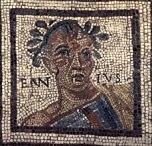
-170 Roman consuls: Aulus Hostilius Mancinus and Aulus Atilius Serranus. The Sixth Syrian War (ends -168) begins when Ptolemy VI's regents launch an invasion of Antiochus IV's realm in Syria. Arsaces III Phriapatius dies, and Arsaces IV, great-grandson of Arsaces I becomes king #4 of Parthia (until -168). About this time Rome begins paving its streets and founding public bakeries; meanwhile the wealthy begin to hide their obscene luxury in suburban villas in Greek Campania. The Nubian language of Meroitic begins to be written; still undeciphered? The Hellenistic city of Antiochia ad Cragum (Antiochia Parva) (Antiochetta) in S Asia Minor on Mt. Cragus (Cragos) on the Mediterranean coast near modern-day Guney, Turkey is founded by Antiochus IV Epiphanes, becoming home to the largest Roman mosaic found in Turkey in modern times. Births: Roman dramatist Lucius Accius (d. -87) in Pisaurum, Umbria; son of a freedman. Deaths: Roman poet Quintus Ennius (b. -239); leaves The Epicharmus, The Euhemerus, The Hedyphagetica, The Saturae, and The Annales, an 18-vol. nat. epic written in Greek dactylic hexameter (of which only 600 lines survive), starting a trend for Roman writers, who give up the lamer native Saturnian meter: "The idle mind knows not what it wants."
-169 Roman consuls: Quintus Marcius Philippus and Gnaeus Servius Caepio. The Lex Voconia, introduced by Quintus Voconius Saxa and supported by Cato the Elder is passed, limiting the amount a Roman woman can inherit in a will; by the end of the cent. propertied women get around the law by selecting a "guardian" as their puppet. Architecture: Gracchus III becomes Roman censor, and builds the Basilica Sempronia near the Roman Forum on land once owned by Scipio Africanus, becoming the 3rd of four basilicas there incl. Basilica Portia, Basilica Aemilia, and Basilica Opimia; in -54 Julius Caesar demolishes it to build his Basilica Julia.
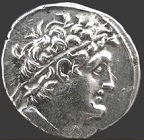
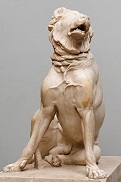
-168 The 153rd Olympiad. Roman consuls: Lucius Aemilius Paullus and Gaius Licinius Crassus. On June 22 King Perseus of Macedonia is defeated by the Romans under consul Lucius Aemilius Paulus Macedonicus (-229 to -160) at the Battle of Pydna on the W side of the Gulf of Thessaloniki, and the city of Thessalonica on the E side surrenders; the battle that proves that the Roman legion is superior to the Macedonian phalanx?; Macedonia falls into Roman hands; the Molossian city of Epirus is sacked; the bronze Molossian Guard Dog Statue is brought to Rome, and praised by Pliny until it is lost in 69 C.E., but a 2nd cent. C.E. stone copy survives, becoming known as the Jennings (Duncombe) (Alcibiades) Dog after it is discovered by Henry Constantine Jennings (1731-1819) in the workshop of Italian sculptor Bartolomeo Cavaceppi (1716-99) in 1753; the Roman Senate's settlement incl. dividing the kingdom into four republics that are heavily restricted from trade or intercourse with each other and with Greece, the deportation of all royal officials, and permanent house arrest of Perseus, breaking the back of the Macedonian Antigonid Dynasty and giving Rome permanent ascendancy in the Hellenic world; Paulus is awarded the title Macedonicus; Paulus' son Scipio the Younger fights by his side at Pydna; a purge of allegedly anti-Roman citizens causes 300K to be deported. That's why I say, hey man, nice shot? On Dec. 25 (winter solstice) violence begins in Jerusalem when the Syrians dedicate the Temple of Jehovah to the worship of Zeus Olympius by order of Antiochus VI Epiphanes, with an altar to Zeus set up on the high altar of Jehovah, causing the Jews to go nonlinear and revolt, stuffing their Hellenization program up their butts, causing Antiochus IV Ephiphanes to respond with ruthless suppression, overrunning Jerusalem and building the Acra Fortress, whose ruins are identified in 2015 C.E. Antiochus IV invades Egypt, and Ptolemy V's cowardice in the war causes the regents to put his younger brother Ptolemy VII Neos Philopator ("father lover") (d. -145) on the throne to rule jointly with him and his sister-wife Cleopatra II; despite his friendliness toward Rome, the Romans "draw a line in the sand" and force Antiochus IV to withdraw, ending the Sixth Syrian War (begun -170); Antiochus IV makes young Ptolemy VI his ward. Arsaces IV dies, and Phraates I (Arsaces IV?) (d. -165), son of Priapatius becomes king #5 of Parthia (until -165), getting mentioned in 2 Maccabees 5:8. Aretas I (d. -140) becomes king of the Nabataeans in modern-day S Jordan, with capital at the rock-walled caravan city of (Sela or Selah) Petra, which features the Treasury, the Monastery, and a huge open platform 1/2-mi. to the S; the city is abandoned in the 7th cent. C.E. After this year the old Roman land tax is no longer levied in Italy, and the only revenue derived from it is from the state domains and through a tax on overseas imports, the revenues from the province of Asia now defraying the expenses of the Roman state; the rich in Rome get richer by squeezing out the free farmers with usury, and running their farms with slave labor to undercut them; Italy slowly turns to sheep and cattle raising, and the uprooted farmers flood the towns, particularly Rome.
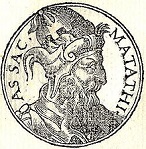

-167 Roman consuls: Quintus Aelius Paetus and Marcus Junius Pennus. The Third Macedonian War (begun -172) ends with Alexander the Great rolling over in his tomb; the Macedonian (Antigonid) kingdom ends, and Macedonia becomes four autonomous districts, each with its own capital city (Amphipolis, Thessalonica, Pella, Pelagonia), paying a moderate yearly tribute; Perseus and his two sons are hauled into Rome as trophies; Roman world domination begins; Macedonians are sold as slaves in Rome, bringing $50-$75 for a male "Alexander" and up to $1K for a female "Olympias". Here they come to save the day? Antiochus IV Epiphanes with the help of his Jewish elites despoils the Jewish Temple and its treasury, sets up a military garrison (the Akra) near the temple, abolishes the observance of traditional Jewish law, decrees that Greek altars be set up in Jewish towns, and establishes a new order of worship called the Cult of the Lord of Heaven, which sacrifies a pig to Zeus on the altar of the Jewish Temple and corrupts the youth with naked uncircumcized gymnastics; just when things look darkest, a hero arose to help them fight for their free-ee-ee-dom to use the good ole Jewish izmel on their boys' dongs, a Jewish Cohen (priest) of Modein (Modiin) (18 mi. NW of Jerusalem), of the macabre line of Hasmon named Mattathias (Mattathiah) Maccabeus (ben Johanan) (the Hasmonean) (d. -165) and his five sons (eldest to youngest) Johanan Maccabeus, Simon Maccabeus (d. -134), Judas Maccabeus (the Hammer) (d. -160), Eleazar Maccabeus (d. -162), and Jonathan Maccabeus (Apphus, Dissembler, or Diplomat) (d. -143), collectively known as the Maccabees (Aramaic "maqqaba" = hammer) (AKA Hasmoneans) balk at Syrian syncretism, kill a Hellenistic Jew who is about to sacrifice to an idol in Mattathias' place, and flee to the mountains, beginning a guerrilla war for the liberation of Judea from the Seleucids and the restoration of the true inch-shorter-and-proud-of-it Jewish religion (ends -163); Judas Maccabeus is designated by his dying father as the leader of the guerrilla forces; the Oniad priest Jason seeks asylum in the Jewish community at Sparta following his failed coup; the Maccabees send ambassadors to Rome seeking an alliance against the Syrians, relying on their contacts with Roman Jews. The Romans kill 500 rebels in Aetolia, and deport 1K hostages from the Achaean League to Italy, incl. Greek historian Polybius (-203 to -118). The Romans make the Greek sacred island of Delos in the Cyclades (birthplace of Artemis and Apollo, where no human is allowed to be born or die) a free port, weakening Rhodes.
-166 Roman consuls: Gaius Sulpicius Galba and Marcus Claudius Marcellus. Perseus, last Antigonid king of of Macedonia (b. -212) dies in captivity in Rome after learning Latin and becoming a notary public. Plays: Terence (-195 to -159), Andria; performed at the Ludi Megalenses in Rome; in 1476 it is performed in Florence, Italy, becoming the first of his plays to be performed in post-antiquity. Deaths: Roman comic poet Caecilius Status (b. 220) in Rome. Macedonian Antigonid king (last) Perseus (b. -212) in Rome (in captivity).

-165 Roman consuls: Titus Manlius Torquatus and Gnaeus Octavius. The Yueh-Chi settle in the Oxus Valley. The Maccabees (Hasmoneans) under Jewish gen. Judas (Judah) Maccabeus defeat four larger Syrian armies in a row with only a few thousand followers, and in Dec. recapture Jerusalem from the Syrians, remove the "horrible abomination" (a dangly uncircumcized statue of Zeus), purify the Temple with a red heifer, and on Dec. 25 rededicate it to Big J (Jehovah) with festivities lasting eight days, giving birth to the 8-day Jewish holiday of Hannukah (Hanukkah) (Chanukah) (John 10:22) (AKA Festival of Lights) after they could only find one cruse of pure olive oil to bless for the ritual, but Big J gives them a miracle and it burns for eight days; the Maccabees rule Palestine until -37. Plays: Terence (-195 to -159), Hecyra (The Mother-in-Law); its debut is cancelled after a rumor that it features boxers and a tightrope walker; in -160 it is finally performed after an attempt to stage it is interrupted by gladiator fans. Births: Chinese royal astrologer (-140 to -110) and historian Sima Tan (Ssu-ma T'an) (d. -110) in Longmen (modern-day Hejin, Shanxi); first person to write Chinese history, passing his unfinished work to his son Sima Qian (-145 to -86).

-164 Roman consuls: Aulus Manlius Torquatus and Quintus Cassius Longinus. The 154th Olympiad sees Leonidas of Rhodes (b. -188) win all three foot race events (incl. the 200m stadion, the 400m diaulos, and the hoplitodromos race in armor, the first ever) in this and the next three straight Olympics, winning 22 gold medals, er, olive wreaths, nine in relays and 12 individual medals, a record which isn't surpassed until Aug. 11, 2016 by Am. swimmer Michael Fred Phelps II (1985-); "the most famous runner" (Pausanias); "He had the speed of a god" (statue of him in Rhodes) - pass the olive oil? A Syrian army of 100K advances to Jerusalem and is repulsed by the Jewish army under Gen. Judas Maccabeus at the Battle of Beth-Zur, causing Antiochus IV Epiphanes to recognize the religious liberty of the Jews; Seleucid forces continue to hold the Acra fortress inside Jerusalem facing the 34-acre Temple Mount; meanwhile Antiochus IV dies during a campaign against the Parthians, and is succeeded by his young nephew Antiochus V Eupator (d. -172 to -161), with Lysias as regent. Ptolemy VI of Egypt is expelled by his brother Ptolemy VII. Gracchus III is sent as a special Roman envoy to Asia Minor, where he establishes friendly relations with a number of native rulers. Births: Syrian Seleucid queen of Syria (-125 to -121) Cleopatra Thea ("the Goddess") Eueteria ("good harvest") (d. -121) in Egypt; daughter of Ptolemy VI (-185 to -145) and Cleopatra II (-185 to -116); wife (-150 to -121) of Alexander Balas, Demetrius II Nicator, and Antiochus VII Sidetes; mother of Antiochus VI Dionysus.
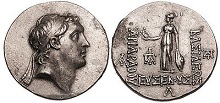
-163 Roman consuls: Tiberius Sempronius Gracchus and Marcus Juventius Thalna. The Roman Senate restores Ptolemy VI and gives the W province of Cyrenaica (Cyrene and Cyprus, the latter known for its licentious worship of Aphrodite) to Ptolemy VII, splitting Egyptian rule; Ptolemy VII only secures Cyrene. Satrap of Media (appointed by Antiochus IV in -175) Timarchos (Timarchus), usurps the Seleucid throne from young tyke Antiochus V Eupator and his regent gen. Lysias (d. -161) (until -160). Ariarates IV dies, and his Roman-educated (Athens-educated?) son Ariarathes V Eusebes Philopator (d. -130) (d. -126?) becomes king of Cappadocia, with capital at Mazaca (modern-day Kayseri); meanwhile Ariarates IV's wife Antiochis's two false sons Orophernes Nicephorus and Ariarathes, whom she put over on him during her childless years are sent into exile. The Jewish Temple fortifications are dismantled and Jewish religious freedom restored. Gracchus III returns to Rome and marries Scipio Africanus' daughter Cornelia, going on to have 12 children, all of whom die at an early age, except his superstar sons the "Gracchi", plus a daughter. Births: Roman statesman Tiberius Sempronius Gracchus IV (d. -133); one of the Gracchi, along with his brother Gaius Sempronius Gracchus (-153 to -121).
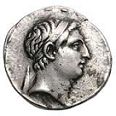

-162 Roman consuls: Publius Cornelius Scipio Nasica Corculum and Gaius Marcius Figulus. Demetrius I Soter (Gr. "savior") (-185 to -150), son of Seleucus IV escapes from detention in Rome to Tripolis with help from historian Polybius, and assumes the throne of Syria, defeating usurper Timarchus, who then sends gen. John Bacchides to Jerusalem and installs Alcimus (Gr. "valiant") AKA Elyaqum (Heb. "El will rise") as high priest (until -159), then returns to Syria, leaving behind a protective force; meanwhile the Battle of Beth-Zechariah sees 50K Seleucids under gen. Lysias defeat 20K Jews and kill Eleazer Maccabeus under a war elephant, after which they siege Jerusalem, but are called back to Antioch, leaving the Jews to worship as they please. Nonfiction: Greek geographer Pausanias of Lydia completes vol. 1 of his 10-vol. Description of Greece, which features his list of the Seven Wonders of the Ancient World, incl. the Great Pyramid of Giza, the Hanging Gardens of Babylon, Colossus of Rhodes, the Lighthouse of Alexandria, the Mausoleum at Halicarnassus, the Temple of Artemis at Ephesus, and the Statue of Zeus at Olympia.
-161 Roman consuls: Marcus Valerius Messala and Gaius Fannius Strabo. Demetrius I Soter defeats his cousin Antiochus V Eupator (b. -172) and gen. Lysias at the Phoenician port of Tripolis (Tripoli) (in modern-day Lebanon), and has them executed, obtaining recognition from Rome; meanwhile Judas Maccabeus grows stronger, and Alcimus petitions for help, causing Demetrius I Soter to send Gen. Nicanor, who loses to Judas at the Battle of Kapharsalama, after which Judas returns to Jerusalem, vents his wrath on the priests, and threatens to destroy the Jewish Temple, after which Judas routs Nicanor's army at the Battle of Beth Horon, and Nicator is KIA. Greek philosophers are banished from Rome again (first time -173). Josina (d. -137) becomes king of the Picts (Scotland). Another sumptuary law is passed in Rome.
Deaths: Greek Seleucid emperor (-163 to -161) Antiochus V Eupator (b. -172).-160 The 155th Olympiad. Roman consuls: Marcus Cornelius Cethegus and Lucius Anicius Gallus. The Syrians under gen. Bacchides defeat the Jewish rebels under Gen. Judas Maccabeus at the Battle of Laisa (Elasa) (Berea) in Beroea (Berea) (ancient Beeroth) (modern-day Bire or Bireh) (10 mi. N of Jerusalem); Judas is KIA, causing Jonathan to become leader of the Maccabees, rallying the troops; unable to defeat him, Bacchides returns to Syria after garrisoning some Jewish towns; unfortunately for the Jews, Judas had sent an embassy to Rome, and it returns after he dies with a treaty which basically gives Rome the right to rule Judea; meanwhile Jewish priest Onias IV goes to Egypt, reads from Isaiah 19:19, and convinces them to erect a Jewish temple in Leontopolis (On) - the original McDonald's franchise? Mas'ud dies, and his son Wahbu (d. -140) becomes the last king of Kaminahu in S Arabia. Nonfiction: Cato the Elder (-234 to -149), De Agri Cultura (Agricultura); oldest surviving Latin lit. encyclopedia. Births: African Numidian king (-113 to -104) Jugurtha (d. -104) in Cirta (modern-day Constantine). Roman senator gen. Quintus Caecilius Metellus Numidicus (d. -91); son of Lucius Caecilius Metellus Calvus (-200 to -135); father of Quintus Caecilius Metellus Pius (-130 to -63); educated in Athens.
-159 Roman consuls: Gnaeus Cornelius Dolabella and Marcus Fulvius Nobilior. Bacchides returns to Jerusalem and makes peace with Jonathan, who becomes gov. of Jerusalem. Inventions: The first water clock (clepsydra) appears in Rome. Births: Roman politician Quintus Mucius Scaevola Pontifex (d. -88); son of Publius Mucius Scaevola (d. -115); father of Quintus Mucius Scaevola Pontifex (-140 to -82). Deaths: Roman playwright Terence (b. -194); wrote six plays, all of which survived to modern times: "I am human, and nothing of that which is human is alien to me" (Homo sum, humani nil a me alienum puto); "Fortune favors the brave" (Fortis Fortuna adiuvat).
-158 Roman consuls: Marcus Aemilius Lepidus and Gaeius Popillius Laenas. On Sept. 2 emperor (since -215) Kogen (b. -273) dies, and Kaika (-208 to -98) becomes Japanese Yamato emperor #9 (until -98) - is it all the unlimited poontang? Syrian gen. Bacchides returns with his army to Palestine, but the Maccabean party has renewed strength and negotiates a treaty; Alcimus the Hellenizing high priest dies of "paralysis"; the priesthood is vacant for seven years. Eumenes II dies, and his 62-y.-o. younger brother (Attalus I's 2nd son) Attalus (Attalos) II (-220 to -138) becomes king of Pergamon (until -138). After Ariarathes V of Cappadocia refuses to obey the Romans and marry his sister, Demetrius I Soter invades and kicks his butt, causing him to flee to Rome, and puts his man Orophernes Nicephorus on the Cappadocian throne; the Romans then intervene and restore Ariarathes V as joint-ruler, but Orophernes is soon expelled. Births: Roman statesman-orator-historian Publius Rutilius Rufus (d. -77); great-uncle of Julius Caesar. Deaths: Japanese Yamato emperor #8 (-215 to -158) Kogen (b. -273) on Sept. 2.
-157 The Syrians recognize Jonathan as the leader of the Jews, and he goes on to unite the Jewish pop. Roman consuls: Sextus Julius Caesar and Lucius Aurelius Orestes. Births: Roman consul Gaius (Caius) Marius (d. -86) in Arpinum; son of a small pleb farmer with equestrian roots; uncle of Julius Caesar.
-156 The 156th Olympiad. Prusias II of Bithynia invades the territories of Pergamon (until -154). Han Wen Di dies, and Prince Liu Sheng becomes Han Jing Di (-181 to -141), Xi Han emperor #6 of China (until -141). Roman consuls: Lucius Cornelius Lentulus Lupus and Gaius Marcius Figulus. Births: Chinese Xi Han emperor #7 (-141 to -87) Han Wu Di (d. -87) on June 30 in Chang'an.
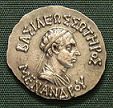
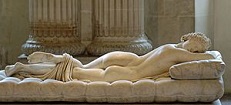
-155 Menander I "the Savior" (Milinda) (d. -130) becomes king of Bactria (until -130), extending his powe from the Kabul River Valley to the Ravi River, Swat River Valley, and Arachosia (modern-day Helmand Province, Afghanistan), patronizing Buddhism. Greek philosophers Diogenes the Stoic (-230 to -150), his student Carneades the Academic (Skeptic) (-213 to -129), and Critolaus the Peripatetic of Phaselis (-200 to -118) come to Rome as envoys from Athens, becoming popular esp. with the youth, raising doubts about the certainty of justice, pissing-off Cato the Elder, who persuades the Roman Senate to ban all Greek philosophers with the soundbyte that if they get infected with Greek lit. they will lose their empire - should have said Jewish lit.? About this time Greek sculptor Polycles sculpts The Sleeping Hermaphroditus, which is placed near the Baths of Diocletian in Rome, along with The Goddess Juno, which is placed in the Portico of Octavia in Rome; the Hermaphroditus is discovered in 1608 and presented to Cardinal Scipione Borghese, who houses it in a special room in his Villa Borghese, and in 1620 pays Gian Lorenzo Bernini to sculpt a buttoned mattress for it; in 1807 it ends up in the Louvre, inspiring Algernon Charles Swinburne's poem "Hermaphroditus" (1863). Roman consuls: Publius Cornelius Scipio Nasica Corculum and Marcus Claudius Marcellus.
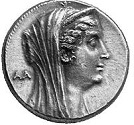
-154 Roman consuls: Lucius Postumius Albinus and Quintus Opimius. The pop. of Massilia (Marseille) appeal to their Roman allies for help against the pesky Oxybii and Decietes (Deciates), who together are known as the Salluvi (Salyes); they are defeated by Roman gen. Quintus Opimius. 10-y.-o. Cleopatra Thea (Gr. "goddess") Euergetis (Gr. "benefactress") (-164 to -121) becomes engaged to her uncle Ptolemy VIII, king of Cyrene, but he ends up marrying her mother (his sister) Cleopatra II. After Pergamon gets help from Ariarathes V of Cappadocia and his son Demetrius, Prusias II of Bythynia is defeated, and withdraws after agreeing to heavy reparations, then sends his popular son Nicomedes II to Rome to try to get them reduced. The Rebellion of the Seven Kings of Wu and Chu, led by Duke Wu takes place in China after Emperor Han Jing Di kills Wu's son Prince Xian (the emperor's cousin) over a game of Liubo. Architecture: The Valerian Road (Via Valeria) across the Appenines to Aternum is begun by Roman censor Marcus Valerius Messalla. Births: Roman statesman Gaius Sempronius Gracchus (d. -121); one of the Gracchi, along with his brother Tiberius Sempronius Gracchus IV (-163 to -133).

-153 On Jan. 1 (new start of the year) Roman consuls begin to assume power. Alexander I Balas (Gr. "lord") (d. -145), pretender son of Antiochus IV Epiphanes marries Cleopatra Thea, then gains Jonathan's support against his rival Demetrius I Soter by offering him the purple and a diadem, making him high priest, and the Jews retain their allegiance to him in the face of counteroffers by Demetrius I; Ptolemy VI Philometer at first supports Alexander against Demetrius I (until -150). Roman consuls: Titus Annius Luscus and Quintus Fulvius Nobilior.
-152 The 157th Olympiad. Jonathan becomes the Jewish high priest despite not belonging to the proper Zadokite family, and establishes friendly relations with Rome. Demetrius I Soter sends his son Demetrius II Nicator to Cnidus as protection against Alexander I Balas. Roman consuls: Lucius Valerius Flaccus and Marcus Claudius Marcellus.
-151 The Achaean hostages are returned. Scipio the Younger goes to Spain as military tribune under consul Lucius Licinius Lucullus. Roman consuls: Aulus Postumius Albinus and Lucius Licinius Lucullus. Deaths: Roman statesman-gen. Tiberius Sempronius Gracchus III (b. -210).
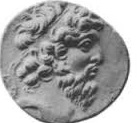
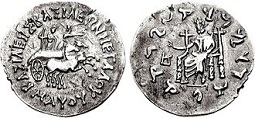

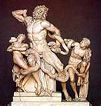
-150 Roman consuls: Titus Quinctius Flaminius and Manius Acilius Balbus. Seleucid emperor (since -161) Demetrius I Soter of Syria (b. -185) is defeated and KIA by pretender Alexander Balas, who becomes king of Syria (until -146); Ptolemy VI Philometer then switches to Demetrius I's son Demetrius II Nicator (-160 to -125), agreeing to take his daughter Cleopatra Thea away from Alexander and give her to him. Mithridates V Euergetes (d. -120), son of Pharnaces I and nephew of Mithridates IV becomes Greek king #7 of Pontus (until -120). About this year the Hasmoneans begin to restore autonomy to Judea, but the Jews begin to split into various sects, incl. the Pharisees (Heb. "divide, separate, set apart") (who accept the written and oral law and advocate democratization of religious practices), the Sadducees (Heb. "tsadduqi" = "right just", after Zadok, first high piest of ancient Israel, Ezek. 40:46) (who reject the oral law and represent the ruling hierarchy, becoming obsessed with separating themselves from whited, er, defilement), and the monk-like ascetic Gnostic Essenes (known for wearing white garments and serving as healers); the Dead Sea Scrolls are begun by clean-freak (daily ablution) Essene monks (Sadducee winer-diners?) in Qumran W of the Dead Sea; "Those Pharisees would purify the Sun itself." The Romans under praetor Servius Galba defeat the Lusitanians in W Spain after springing a clever trap, killing 9K and capturing 20K POWs, who are sold as slaves in Gaul. About this time the Celtic Gaelic-speaking Gaels (Milesians) AKA Sons of Mil begin fleeing Roman incursions in N Spain and S Gaul and settling in Ireland, landing at the mouth of the Boyne River in E Ireland and Kerry in S Ireland, the first group settling in N Leinster and setting up the Kingship of Tara, the latter group settling in Cashel ("stone ringfort") in modern-day County Tipperary. About this time the Gaels begin subjugating the Belgae and Laighins, finally taking over the midlands in 516 C.E. About this time a movement to define a distinct Roman culture in opposition to Hellenism begins, while Roman wealth is busy attracting Greek artists. Fat, deformed Lady (Marchioness) Tai (Dai) (b. -100), wife of the PM to Prince Ch'ang-sha in the Hunan district of C China dies of heart failure brought on by arteriosclerosis and colic (her stomach contains 138 melon seeds); her elaborate tomb at Ma-wang-tui near Hunan is discovered in 1971, her body well preserved in a charcoal-encased coffin, complete with food, clothes, 162 wooden servants and musicians, and a silk banner containing a painting of her; the People's Rep. of China comments that it "shows how brutally the feudal ruling class oppressed and exploited the laboring people". About this time the nomadic E Iranian-Scythian Saka people are pushed by the Yuezhi people W into Sogdiana, crossing the Syr Darya into Bactria, displacing Greeks; meanwhile more Sakas move S to NW India incl. Kashmir, Punjab, Sindh, Haryana, Gujarat, Maharashtra, Uttar Pradesh, Bihar, and Rajasthan, starting with the Indus River Valley in about -88. Inventions: About this time (-150 to -100) the Antikythera Mechanism is created, discovered in 1901 C.E., becoming the world's first computer, computing lunar-solar motions with gears, based on the off-center circle Hipparchos Model of the Moon's elliptical orbit around the Sun; the first astrolabe?; a Roman ship carrying it sinks off Antikythera Island in S Greece about -65, and is recovered in 1900 C.E.; the eclipse prediction is based on Babylonian rather than Greek math, and the astronomical calculations begin in -205; no instruments of comparable complexity are made for 1K years until Baghdad in 900 C.E. after the Romans and Greeks fail to pass on their technology, and the Muslim device is much simpler; designed by Hipparchos of Rhodes? Nonfiction: The First Book of Maccabees is written in the last half of this cent. Art: About this time the strangely Christ-like Laocoon (Laocoön) Group is sculpted by Hagesandros (Agesander), Athenedoros (Athenodorus) and Polydoros (Polydorus) of Rhodes, depicting the brother of Anchises (father of Aeneas), a priest of Poseidon being strangled by sea serpents along with his two young sons Antiphantes and Thymbraeus at the orders of Minerva after he tries to warn the Trojans that the Trojan Horse is a trick, uttering the immortal soundbyte: "Timeo Danaos et dona ferentes" (Beware of Greeks bearing gifts) (I fear Greeks even when they bear gifts); discovered in Rome in 1506 C.E., its anatomical accuracy and depiction of agony wows hard-to-please German critic Gotthold Lessing. Deaths: Greek Seleucid emperor (-161 to -150) Demetrius I Soter (b. -161).
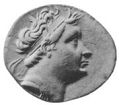

-149 Achaean League head Callicrates dies. After learning of a plot to murder him, Nicomedes II Epiphanes (d. -127), supported by Attalus II of Pergamum revolts against his father Prusias II and executes him, and becomes king #6 of Bithynia (until -127), going on to become a steady ally of Rome, even against Pergamum. The Third Punic War (ends -146) begins after the vicious Roman senators become jealous of the fact that Carthage has regained some kind of prosperty and trade, and encourage Numidia to encroach upon their territory until they are forced to fight, then, declaring that they have broken the treaty, pounce; first Rome demands hostages, the surrender of arms, and then the abandonment of Carthage, telling them to move to a spot at least 10 mi. from the sea (to kill their sea trade); Carthage resists, and Rome attacks, but narrowly avoids disaster as the Carthaginians, seeing the end is near, fight back in a grimly determined manner. Andriscus (Andriskos) (d. -148) ("Pseudo-Philip") ("False Philip"), a fuller from Adramyttium in Aeolis, W Anatolia who claims to be the son of Perseus of Macedon and leads the Fourth Macedonian War against Rome (ends -148); after failing to find a following in Macedonia, he asks for help from Demetrius Soter of Syria, who hands him over the Romans, but he escapes and reappears in Macedonia with an army of Thracians and defeats praetor Publius Juventius, assuming the title of king Philip VI of Macedonia (until -148), becoming the last king of Macedon. Hu Shin produces a Chinese dictionary of 10K chars. Roman consuls: Manius Manilius and Lucius Marcius Censorinus. Deaths: Numidian king Masinissa (b. -238). Roman politician Cato the Elder (b. -234); leaves De Agri Cultura (On Agriculture) (ca. -160); Origines (7 vols.) (ca. -168), becoming the first Latin writer of history, writing abe urbe condita (from the founding of the city of Rome), extolling Roman virtues and claiming that not only Rome but other Italian towns were venerable, thus Romans are superior to the Greeks.
-148 The 158th Olympiad. Roman consuls: Spurius Postumius Albinus Magnus and Lucius Calpurnius Piso Caesoninus. After conquering Thessaly and allying with Carthage, Macedonian pretender Andriscus is defeated 2x by the Romans under praetor gen. Quintus Caecilius Metellus (-210 to -115), causing him to flee to Thrace, whose prince gives him up to the Romans, ending the Fourth Macedonian War (begun -149); Macedonia is made a Roman province, and Metellus is given the agnomen Macedonicus. Another year of failure for the Romans in Carthage causes extreme panic in Rome. Architecture: The Via Postumia (Postumian Road) in N Italy is begun, running from coastal Genua through the mountains to Dertona, Placentia, and Cremona near the Po River, then E to Bedriacum and modern-day Calvatone, branching right to Mantua and left to Verona, crossing the Adige River on the Ponte Pietra, then crossing the Piave River at Maserada sul Piave, ending up in Aquileia, allowing the Romans to eventually conquer Liguria.
-147 Roman consuls: Publius Cornelius Scipio Africanus and Gaius Livius Drusus. The Roman census gives the pop. of the Roman Empire as 322,000. Demetrius II Nicator, son of Demetrius I Soter revolts from Alexander I Balas, and defeats his gen. Apollonius. After Scipio the Younger, favorite of the army and the people is elected consul and invested with the supreme command, the Romans begin a siege of Carthage, cutting off all supplies by land and sea, and building a mole across the harbor. Sparta and Achaea go to war, and the Achaean League revolts from Rome. Mithridates I the Great of Parthia conquers Babylonia and Media from the Seleucids.

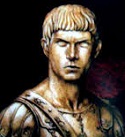
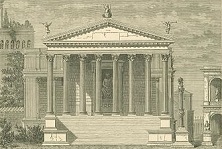
-146 Roman consuls: Gnaeus Cornelius Lentulus and Lucius Mummius Achaicus. The Romans under Quintus Caecilius Metellus Macedonicus defeat the Arcadians at the Battle of Chaeronea; meanwhile the Achaean League under strategos Critolaos of Megalopolis attacks Sparta, but the Romans under consul Lucius Mummius Achaicus and praetor Quintus Caecilius Metellus Macedonicus crush them at the Battle of Scarpheia, where Critolaos is KIA and replaced by Diaeus, followed by the followed by the Battle of Corinth (to avenge an insult made to the Roman embassy there), then destroy Corinth, slaughter the men, and sell the women and children into slavery, then dissolve the Achaean League, substituting oligarchies for democracies, and annex Greece, placing it under the supervision of the Roman gov. of Macedon Macedonicus, who is permanently installed in Thessalonica; once-proud Greece becomes another tribute-paying Roman province, full of people every Equestrian would like to own?; Macedonia's four districts are formed into a koinon by Rome, with capital at Beroea at the foot of Mt. Bermios (seat of the imperial cult); from now on Greeks work as slaves and peddle their cerebral culture to their practical-minded Roman masters, while living in the past in a state of denial? - don't worry, Romans, you'll know what it feels like one day? Starving Carthage resists Scipio the Younger (Publius Cornelius Scipio Aemilianus Africanus Numantinus) (-185 to -129) and his Roman army almost to the last man, the final street fighting lasting six days, but finally capitulates when they are down to 50K out of 500K; the survivors are sold into slavery, the city is sacked and burned to the ground and taken apart stone by stone, the fields plowed and sown with salt, and a curse solemnly invoked upon anyone who dares attempt to rebuild it; the region becomes the Roman Province of Africa, the richest in the Western empire, which lasts until the Vandal invasion of the 5th cent. C.E.; 17-y.-o. Tiberius Sempronius Gracchus IV (b. -163) takes part in the fun, and is the first Roman to scale the city wall; meanwhile Roman gen. Quintus Caecilius Metellus is given a triumph, parading his trophy Andronicus around and receiving the title pf "Macedonicus"; Rome's V over the civilized Western world is complete, and the Roman Empire now consists of seven provinces: Sicily, Sardinia, Corsica, Nearer Spain (N), Further (S) Spain, Gallia Transalpina, Macedonia, and Africa. Ptolemy VI Philometer captures Antioch in support of Demetrius II Nicator, and his Alexander I Balas' wife Cleopatra Thea switches dicks in the middle of a you know what and marries Demetrius II. Architecture: To celebrate his triumph for his V at the Battle of Scarpheia, Quintus Caecilius Metellus Macedonicus builds the Hexastyle peripteral Temple of Jupiter Stator (the Stayer) in the Roman Forum, along with the Temple of Juno Regina in the S half of the Campus Martius near the Circus Flaminius (built -179), and the Porticus Metelli (replaced in -26 by Augustus with the Porticus Octaviae), designed by Greek architect Hermodorus of Salamis from Salamis, Cyprus, becoming the first Roman temple built entirely of marble; too bad, the statues of Jupiter and Hera are set up in each other's temples by mistake; a legend attributes the design to Spartan architect Saurus and Batrachus because of depictions of a lizard (sauros) and frog (batrachos), but no inscriptions. The Forum Boarium (cattle forum) is built in Rome near the Tiber River, with strong Greek influences, incl. a round tholos temple built of imported Attic Pentalic marble. Nonfiction: About this time Megalopolis, Arcadia-born Greek historian Polybius (-203 to -118), who witnessed the sack of Carthage this year and was awed with Roman might begins writing a 40-vol. History of Rome, covering the Roman Repub. from -264 to -146, its wars with Carthage starting in -220, and its rise to top dog status in the Mediterranean world, which becomes instrumental in convincing Greeks to give into the inevitable and change their ways; he champions the idea of factual integrity in historical writing, and proposes the separation of powers in govt., later adopted by Montesquieu and the Am. Founding Fathers; he claims that the pesky Celts are backwards and don't know any Science - playing the Planet of the Apes chimps to the Roman gorillas?


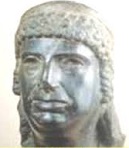
-145 In July debauched Alexander Balas is defeated in Antioch by Demetrius I Soter's son Demetrius II Nicator (Gr. "conqueror") (-160 to -125), who in Sept. becomes king of Syria (until -138), immediately facing several usurpers while Ptolemy VI Philometer marries his daughter (Balas' old wife) Cleopatra Thea, and dies a few days later from wounds sustained in the fighting, and his 16-y.-o. son Ptolemy VII Neos ("new Dionysos") Philopator (Philopater) ("father lover") becomes king #7 of Egypt's 32nd (Ptolemaic) Dynasty, with his mother Cleopatra II as regent; his uncle Physcon then marries her and murders him during the wedding feast, assuming the throne as Ptolemy VIII Euergetes ("benefactor") II Physcon ("fat bellied") (-182 to -116), becoming king #8 of Egypt's 32nd (Ptolemaic) Dynasty: he then marries Cleopatra II's daughter (his niece) Cleopatra III (-161 to -101), who becomes the main player; meanwhile Demetrius II Nicator attacks the Egyptian army - the spark happens? Antiochus V's son Antiochus VI appoints Simon Maccabeus as gov. "from the Ladder of Tyre (Klimax Tyrou) to the borders of Egypt". Architecture: In response to the desecration of the Temple of Jerusalem under Antiochus IV Epiphanes and the supplanting of the legitimate line of Jewish priests by the installation of Alcimus, a Jewish temple is founded in Leontopolis (Gr. "city of the lions") in the Nile Delta, which becomes known as the Land of Onias; it is presided over by priests of the family of Onias IV, and it becomes the only Jewish temple outside of Jerusalem where sacrifices are offered. Births: Chinese Han Dynasty eunuch royal astrologer (-107 to -86) and historian ("the Herodotus of China") ("Father of Chinese Historiography") Sima Qian (Ssuma Ch'ien) (d. -86) in Longmen (near modern-day Hangchen); son of royal astrologer Sima Tan (-165 to -110).
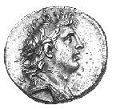
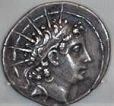
-144 The 159th Olympiad. Roman consuls: Servius Sulpicius Galba and Lucius Aurelius Cotta. Alexander I Balas' general Diodotus Tryphon (d. -138) deposes Demetrius II (who is saved by soldiers from Judah, and flees to Seleucia), and rules in Antioch on behalf of Alexander's 2-y.-o. son Antiochus VI Dionysus (-148 to -141) (until -140). Architecture: The Aqua Marcia, Rome's longest of 11 aqueducts is begun by praetor Quintus Marcius Rex (ancestor of Julius Caesar) using spoils from the conquest of Corinth and Carthage (finished in -140), becoming known for its cold pure water, helping Rome grow into a large city.
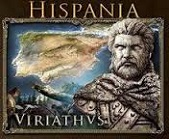
-143 Roman consuls: Appius Claudius Pulcher and Quintus Caecilius Metellus Macedonicus. The Third Numantine War (ends -133) in Numantia (W Spain/Portugal) begins when Lusitanian leader (since -147) Viriathus (-180 to -139) leads a revolt against the Romans, scoring several Vs until his own men murder him in his sleep after the Romans under Macedonicus defeat the Arevaci in NC Hispania; "It seemed as if in that thoroughly prosaic age, one of the Homeric heroes had reappeared." (Theodor Mommsen) Despite supporting him, Jonathan Maccabeus is tricked by jealous Diodotus Tryphon into being captured, then assassinated.
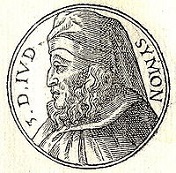
-142 The Roman census gives the pop. of the Roman Empire as 322,442. Jonathan Maccabeus is succeeded as gov. of Jerusalem and high priest by his brother Simon Maccabeus (Thassi) ("the Boss") (d. -135), who expels the Seleucids from Jerusalem and declares Judea an independent nation for the first time since the 8th cent. B.C.E.; the Hasmonean Dynasty begins in Judea (ends -63); Demetrius II affirms Jewish independence and makes an alliance with Simon, freeing Jews from Seleucid taxation; all Seleucid are expelled from the citadel at Jerusalem; a Jewish embassy under Numenius goes to Rome, causing Roman consul Lucius Caecilius Metullus to address letters to a number of countries reaffirming a Roman protective alliance with the Judean Jews (1 Macc. 15:15-24). Scipio the Younger becomes a big man in Rome, gathering around him the Scipionic Circle of brain men (I don't see that in my anatomy textbook?), incl. Greek historian Polybius, Greek philosopher Panaetius, Roman playwright Terence, and Roman satirist Gaius Lucilius; meanwhile he is elected censor, and tries to follow in the footsteps of Marcus Porcius Cato in suppressing luxury and immorality without the benefit of them neat Billy Graham gospel sermons - I'm amazed at how quickly they turn their 15K-rhinestone wardrobe around? Roman consuls: Quintus Fabius Maximus Servilianus and Lucius Caecilius Metullus Calvus.
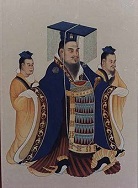
-141 On Mar. 9 Han Jing Di dies, and Liu Che becomes Han Wu Di (-156 to -87), Xi Han emperor #7 of China (until Mar. 29, -87); Han Jing Di is buried in a tomb 95 mi. from Peking in a fabulous jade suit, with 2K plates sewn together with gold wire, along with 2.8K expensive funeral offerings; his wife Tou Wan has to wait until -104 to get her jade immortality suit. Macedonia becomes a Roman province. Taking advantage of the confusion, Mithridates I the Great of Parthia conquers Media and Babylonia; the Parthians, originally from E Iran now own Mesopotamia, reducing the Seleucid kingdom to Syria. Simon is chosen by the congregation (popular assembly) as high priest and ethnarch (civil gov.) of Judea, and both offices are made hereditary in his Hasmonean family. Roman consuls: Gnaeus Servilius Caepio and Quintus Pompeius.

-140 The 160th Olympiad. In summer Diodotus Tryphon kills 7-y.-o. Antiochus VI and proclaims himself king of Syria, becoming the first to use the name Tryphon; Rome doesn't buy it and refuses to recognize the bum. Aretas I dies, and Rabbel I (d. -103) becomes king of the Nabataeans (until -103). Roman consuls: Quintus Servilius Caepio and Gaius Laelius Sapiens. Inventions: About this time Greek #1 astronomer Hipparchus of Nicaea (-190 to -120) discovers trigonometry along with the precession of the equinoxes by observing the bright star Spica in Virgo. Greek Stoic philosopher Crates of Mallus, head of the library of Pergamum creates a Globe of the Earth. Wheel bearings are found on a wagon from this period in Dejbjerg, Jutland. Poetry: About this time Greek epigrammist Antipater of Sidon composes the poem The Seven Wonders of the Ancient World; "I have set my eyes on the wall of lofty Babylon on which is a road for chariots, and the statue of Zeus by the Alpheus, and the hanging gardens, and the Colossus of the Sun, and the huge labor of the high pyramids, and the vast tomb of Mausolus; but when I saw the house of Artemis that mounted to the clouds, those other marvels lost their brilliancy, and I said, 'Lo, apart from Olympus, the Sun never looked on anything so grand'." Births: Chinese Han gen. Huo Qubing (d. -117) in Linfen, Shanxi; half-brother of Huo Guang (d. -68). Roman orator Lucius Licinius Crassus (d. -91). Roman orator Marcus Antonius (d. -87). Roman jurist Quintus Mucius Scaevola Pontifex (d. -82); son of Quintus Mucius Scaevola Augur (-159 to -88). Armenian king (-95 to -55) Tigranes II (the Great) (d. -55); son or nephew of Tigranes I or Artavasdes I; husband of Cleopatra (b. -110), daughter of Mithridates VI of Pontus.
-139 Mithridates I the Great of Parthia conquers Susa and Elam from the Seleucids. Lusitanian leader Viriathus is killed in his sleep by his own men after they had been sent as emissaries to the Romans and sold-out, after which the consul orders their execution, with the soundbyte: "Rome does not pay traitors"; Tautalusnever try to run a racket on a racketeer? An expedition of Zhang Du (d. -114) to the West begins (ends -132). Roman consuls: Gnaeus Calpurnius Piso and Marcus Popillius Laenas. Births: Jewish queen (-76 to -67) Salome (Shelamzion) Alexandra (d. -67).

-138 Roman consuls: Publius Cornelius Scipio Nasica Serapio and Decimus Junius Brutus Callaicus. In July-Aug. Demetrius II of Syria is captured by Mithridates I of Parthia after adding Elam, Persia, and parts of Bactria to his kingdom and making Ctesiphon-Seleucia his capital; after Demetrius II's younger brother Antiochus VII Euergetes Eusebes Soter Sidetes ("benefactor pious savior") (d. -129) sieges him in Dor, Diodotus Tryphon escapes, then commits suicide in Apamea, and Antiochus VII becomes king of downsizing Syria (until -129), turning it around and beginning to restore its power by scoring several Vs against Parthia. Attalus II dies, and his nephew (Eumenes II's son) Attalus (Attalos) III Philometor ("mother loving") Euergetes (-170 to -133) becomes king of Pergamon; he narrows the entrance to the harbor of Ephesus, causing it to silt up? Births: Roman gen.-statesman Lucius Cornelius Sulla Felix (d. -78) in Rome.
-137 Early in the year Antiochus VII's cmdr. Cendebeus is defeated by Simon Maccabeus. The original Inspector Clouseau in the Pink Panther by Henry Mancini? The Roman push into the plains of Spain hits a snag? Roman Gen. Hostilius Mancinus makes an ass of himself at the ancient Celtiberian city of Numantia in NC Spain, is defeated and his 20K-man army put at their mercy, then saved by his quaestor Gracchus IV after the victors refuse to negotiate with anybody but the son of their former benefactor Gracchus III; Mancinus is recalled and replaced by Marcus Aemilius Lepidus Porcina (greatest orator of his age, according to Cicero), but he makes a bigger ass of himself, making war on the peaceful Vaccaei after accusing them of assisting Numantia only to run out of supplies, and is deprived of command in the field, becoming the first Roman gen. thus disgraced; meanwhile the Celtic Gallaeci (Callaeci) tribal confederation in NW Spain (Galicia) is conquered by the Romans under Quintus Servilius Caepio. Cleopatra Thea marries Antiochus VII. Finnanus (d. -107) (fine what?) becomes king of the Picts (Scotland). Roman consuls: Marcus Aemilius Lepidus Porcina and Gaius Hostilius Mancinus.
-136 The 161st Olympiad. The Roman census gives the pop. of the Roman Empire as 317,933. About this year the apocryphal (deuterocanonical) History of Susanna (Heb. "lily"), AKA "Susanna and the Elders", AKA "The Judgment of Daniel", an addition to the Bible book of Daniel is written, becoming one of the first detective stories, where two Jewish elders attempt to frame her on adultery because she won't hook up with them, and Daniel defends her in court, getting them to contradict each other about what kind of tree the adultery was committed under, getting her let off; it gets incl. by the Roman Catholic and Eastern Orthodox Churches in the Book of Daniel as Ch. 13 along with The Song of the Three Holy Children (Young Men), The Prayer of Azariah (Abednego) (in the furnace), and The History of Bel and the Dragon (where Daniel proves that the priests of Bel or Baal sneak into his temple and eat his sacrifces, and later kills a snake by feeding it pitch, hair, and fat, featuring an appearance by Jewish prophet Habbakuk, who brings him some stew in the lion's den) in the Greek Septuagint and Roman Catholic Latin Vulgate (all written in this cent.?), but they are all later omitted from Protestant Bibles.
-135 Roman consuls: Quintus Calpurnius Piso and Servius Fulvius Flaccus. Births: Greek king of Pontus (-120 to -63) Mithridates (Mithradates) VI Eupator Megas (the Great) Eupator Dionysius (d. -63); son of Mithridates V and Gespaepyris. Greek #1 polymath Stoic pansophist philosopher-historian-astronomer-geographer-politician Posidonius "the Athlete" of Apameia (Apamea) (Rhodes) (d. -51) in Apameia on the N Syrian coast near the Orontes River; studies in the Stoic school in Athens under Panaetius; settles in Rhodes in -95.
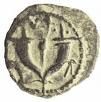
-134 On Jan. 1 Scipio the Younger is elected consul again, and sent to Spain to do it right and conquer Numantia, seat of the Spanish revolt, beginning the Siege of Numantia (ends -133), later turned into a tragedy by Miguel de Cervantes. In Jan. Jewish high priest Simon Maccabeus along with his two eldest of three sons are assassinated by his son-in-law Ptolemy, and after Antiochus VII Sidetes invades Judaea and sieges Jersualem, his surviving son John (Johanan) Hyrcanus I (d. -104), gov. of the Judean coast is recognized as high priest, going on to free Judea from Syrian influence and begin a series of military campaigns to expand Jewish domains. Roman consuls: Gaius Fulvius Flaccus and Publius Cornelius Scipio Africanus Aemilianus the Younger.

-133 Roman consuls: Lucius Calpurnius Piso Frugi and Publius Mucius Scaevola (d. -115). Numantiais is starved into submission, captured, and sacked by Scipio Africanus the Younger, adopted grandson of Scipio Africanus the Elder after a 15-mo. siege, ending the Third Numantine War (begun -143); the Celtic Vaccaei (Vaccei) tribe in the Duero River Valley in NC Spain is conquered; Scipio receives the surname Numantius to add to that of Africanus; Antiochus VII Sidetes sends him lavish presents. Attalus (Attalos) III Philometor dies after he wills the kingdom of Pergamon (Pergamom, Pergamos) (modern-day Bergama) in W Asia Minor to Rome, incl. the city of Ephesus, which becomes the official residence of the gov. of the Roman province of Asia, and Troas, which becomes a Roman colony; Hierapolis becomes a flourishing Roman city; in 2013 C.E. the Ploutonian (Gates of Hades) in Hierapolis is discovered; Attalus II Philadelphus's son Eumenes III Aristonicus (d. -129) starts a revolt (ends -129). Phrygia becomes a Roman province. Gaius Sempronius Gracchus IV (-153 to -121) attempts to arrest the decline of Tarentum by founding a Roman colony there; his older reformer brother Tiberius Sempronius Gracchus IV (-163 to -133) is elected tribune of the people, champions the cause of the common people and small farmers, and gets legislation passed providing for more equitable distribution of public lands, with a 3-man committee consisting of he, his brother Gaius (who is in Spain), and Appius Claudius appointed to handle the distribution, but when his term expires he makes a boo-boo by seeking re-election in violation of the age-old prohibition of two successive terms, causing his aristocratic enemies to spread rumors that he is trying to become a dictator, resulting in a riot in which he is murdered on the night before a scheduled speech on reform of agrarian laws, and his body cast into the Tiber River, after which the Senate issues its first Senatus consultum ultimum (SCU) (Final Decree of the Senate), "let the consuls see to it that the state suffer no harm"; Scipio the Younger, brother-in-law of Tiberius Sempronius Gracchus is a leader of the aristocratic party, and disclaims sympathy for the Gracchi. Science: Chinese alchemists attempt to turn cinnabar into gold. Deaths: Roman statesman Tiberius Sempronius Gracchus IV (b. -163) (murdered).

-132 The 162nd Olympiad. Roman consuls: Publius Popillius Laenas and Publius Rupilius. Mithradates I the Great dies, and his son Phraates II (d. -126) becomes king #7 of Parthia (until -126). Arab Nabataean (Nabatean) found the Osrhoene (Osroene) (Osrohene) Kingdom under the Abgar Dynasty, with capital at Edessa, which lasts till 244 C.E. Architecture: The Popilian Way (Via Popilia) is begun by consul Publius Popilius Laenas, extending the Via Flaminia N along the Adriatic coast to Aquilea (modern-day Venice).
-131 Roman consuls: Lucius Valerius Flaccus and Publius Licinius Crassus Dives Mucianus. The Roman census gives the pop. of the Roman Empire as 318,823. Roman hero gen. Quintus Caecilius Metellus Macedonicus is elected censor, giving a speech proposing to make matrimony mandatory for all citizens in order to halt sexual libertinage, which draws strong popular opposition led by tribune Gaius Altinius Labeo Macerio; a cent. later Augustus orders the speech read to the Senate. Gaius Gracchus returns to Rome, but takes no major part in public affairs and lies low after what they did to his big brother. Publius Mucius Scaevola (d. -115) becomes Roman pontifex maximus, becoming the last to pub. the Annales Maximi, a record of the year's events, which are replaced by the Acta Diurna Populi) (Publica) (Urbana) (Daily Public Records), containing a daily record of all public events in Rome, which are displayed in public places then preserved as historic material. Cleopatra II revolts against Ptolemy VIII and expels him and Cleopatra III from Egypt, causing Ptolemy VIII to hole-up in Cyprus and murder his stepson Ptolemy and his son Ptolemy Memphites, and have the latter's dismembered head, hands, and feet sent to her in Alexandria as a birthday present; Cleopatra II rules Egypt until -127.
-130 Ptolemy VIII leaves Cyprus and returns to Egypt, launching a civil war with Cleopatra II. Antiochus VII Sidetes of Syria expels the pesky Parthians from Babylonia and Media. Ariarathes V of Cappadocia is KIA while helping the Romans fight Aristonicus of Pergamum, causing the Romans to reward him by adding Lycaonia and Cilicia to his dominions; after his ambitious wife Nysa poisons his five other sons, and is stopped by the nobles before she can do in her youngest son Ariarathes VI Epiphanes Philopator (d. -116), he becomes king of Cappadocia (until -116), with Nysa as regent - side effects were usually mild, incl. headaches, nosebleeds, and coughing? Chinese emperor Han Wu Di establishes an admin. with scholars and a civil system. Roman consuls: Lucius Cornelius Lentulus and Marcus Perperna. Architecture: Zhang Du's expedition helps open the 4K-mi. Silk Road, stretching from E China through Edessa to the Mediterranean Sea (finished -115). Births: Greek eclectic philosopher Antiochus of Ascalon (d. -68); pupil of Philo of Larissa and teacher of Cicero; combines Stoicism and Platonism. Roman politician gen. Quintus Caecilius Metellus Pius (d. -63); son of Quintus Caecilius Metellus Numidicus, given the cognomen Pius for endless devotion to his father's attempts to get recalled from exile. Deaths: Roman dramatist-painter Marcus Pacuvius (b. -220).
-129 In spring after demanding restoration of all Seleucid territories in Persia, Antiochus VII is defeated in Ecbatana, Babylonia (Media) by Phraates II of Parthia, and commits suicide in May, permanently losing the lands E of the Euphrates, and causing the Seuleucid Empire, now reduced to Syria and Cilia to begin to collapse; Demetrius II Nicator is sent back to Syria by Parthian king Phraates II and regains the Seleucid throne (until -125). Aristonicus' revolt is suppressed, and Pergamon becomes the Roman province of Asia (Rome's 8th province) (AKA Phrygia), the first city to make an alliance with Rome, and a center of Roman emperor worship. Idumea (S of Judea) is conquered by John Hyrcanus I, and its native pop. of Arabs and others forced to undergo Judaization incl. circumcision; it is then incorporated into the Hasmonean Empire. The Parthian Arsacids establish their winter residence at Ctesiphon (Casiphia), on the left bank of the Tigris River below Baghdad, and revive trade between the Mediterranean and Far East through the city of Dura-Europus on the mid-Euphrates River. Roman consuls: Gaius Sempronius Tuditanus and Manius Aquillius. Births: Greek physician (in Rome) (founder of the Methodic School) Asclepiades of Bithynia (d. -40) in Prusa, Bithynia. Deaths: Greek philosopher Diogenes the Stoic (b. -230). Greek philosopher Carneades the Academic (b. -213). Roman gen.-statesman Scipio Africanus the Younger (b. -185); destroyer of Carthage.

-128 The 163rd Olympiad. Alexander II Zabinas (d. -123), backed by Ptolemy VII Physcon challenges Demetrius II Nicator for the Seleucid throne; meanwhile Demetrius intervenes in the Egyptian civil war on the side of Cleopatra II, but is defeated near Pelusium. John Hyrcanus I destroys the Samaritan temple on Mount Gerizim - the only good Samaritan? Roman consuls: Titus Annius Rufus and Gnaeus Octavius.

-127 Cleopatra II is forced by Ptolemy VIII to flee to Syria, joining her daughter Cleopatra Thea and son-in-law Demetrius II Nicator. Phraaates II dies in battle fighting the Tochari (Scythians)(Sacae) (Sakas), leaving the kingdom devastated and the succession in confusion; Artabanus I (d. -124), brother of Mithradates I becomes king #7 of Parthia (until -124). Nicomedes II dies, and his son Nicomedes III Euergetes (d. 94) becomes king #7 of Bithynia (until -94), going on to become ruler of Paphlagonia on the Black Sea coast between the Parthenius and Halys Rivers. Roman consuls: Lucius Cornelius Cinna and Lucius Cassius Longinus Ravilla; known for the original conspiracy theory soundbyte "Cui bono" (Who benefitted)?

-126 Roman consuls: Marcus Aemilius Lepidus and Lucius Aurelius Orestes. A Roman army under consul Lucius Aurelius Orestes (d. -103) goes to Sardinia to quell another revolt, and Gaius Gracchus tags along as quaestor. Phraates II is KIA in battle against Tochari and Saka nomads from Sakastan (modern-day Sistan in E Iran and S Afghanistan) in the E, and (after his other uncle Bacasis briefly reigns?) his uncle Artabanus II (d. -122), son of Priapatius becomes king #8 of Parthia (until -122). Architecture: The Aqua Tepula aqueduct in Rome is built by censors Gaius Servilius Caepio and Lucius Cassius Longinus, with its source in the Alban Hills only 11 mi. from Rome, known for being lukewarm but not drinkable, causing them to be mixed with waters from the Aqua Marcia; Murphy's Law wins, and it becomes the highest aqueduct, hence the one with the widest distribution, although the one with the poorest quality water, plus the smallest to boot.

-125 Roman consuls: Marcus Fulvius Flaccus and Marcus Plautius Hypsaeus. The Roman census gives the pop. of the Roman Empire as 394,736. King Demetrius II of Syria is conquered by Alexander II Zabinas and the Egyptians near Damascus, and is murdered as he attempts to land in Tyre; he is succeeded by his eldest son Seleucus V, but his mother Cleopatra Thea removes him in favor of the younger son Antiochus VIII Epiphanes Philometor Callinicus Grypus ("God manifest mother-loving gloriously victorious hook-nosed") (-144 to -96). Despite the Senate attempting to keep him from returning to Rome by extending his term as quaestor, Gaius Gracchus returns without authorization. War breaks out between the Romans in Massilia (Marseille) and the Celtic Salluvii (Salyes) tribe on the Druentia Plain (Durance) S Gaul again, causing Roman consul Marcus Fulvius Flaccus to kick some butt this year and next, becoming the first Roman to overcome the transalpine Ligurians in war, returning to Rome in -123 for a triumph. Architecture: The Cassian Way (Via Cassia) in Rome is begun, branching from the Via Flaminia near the Milvian Bridge and passing near Veii in Etruria, joining the Via Aurelia at Luna.
-124 The 164th Olympiad. Artabanus I of Parthia dies in battle against the Tochari (Scythians). Ptolemy VIII and his sister Cleopatra II of Egypt reconcile. Roman consuls: Gaius Cassius Longinus and Gaius Sextius Calvinus.
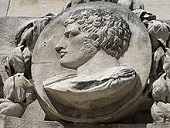
-123 Roman consuls: Titus Quinctius Flaminius and Quintus Caecilius Metellus Baliaricus. Gaius Sempronius Gracchus (-154 to -121) is elected tribune, devoting himself to enforcement of his late brother's agrarian laws despite their being allowed to lapse, following his brother's footsteps by pursuing new legislation for the common people, pissing-off the aristocrats gain. The Romans under gen. Gaius Sextius Calvinus conquer the Celtic Salluvii (Salyes) tribe in S Gaul, causing their king Tutomotulus (Teutomalius) to flee to the protection of the Allobroges tribe, which controls the territory between the Rhone River and Lake Geneva N of Massalia, causing Rome to declare war on them too; the Romans destroy the chief town of the Salluvii and found the Roman colony of Aquae Sextiae (hot springs of Sextius) (modern-day Aix-en-Provence) (modern-day pop. 142K) giving some of the captured territory to Massilia; the Romans also capture Arles in S Gaul from the Salluvii and attempt to build into a commercial city, although it never escapes from the shadow of Massalia. Syrian pretender Alexander Zabinas is conquered and executed. Carthage is rebuilt. Births: Roman statesman gen. Quintus Sertorius (d. -72). Greek physician (founder of the Methodic School) Themison of Laodicea (d. -43); pupil of Asclepiades of Bithynia.
-122 Roman consuls: Gnaeus Domitius Ahenobarbus and Gaius Fannius. Gaius Gracchus is reelected tribune, continuing to get new laws passed, incl. one letting Roman citizens purchase grain at half price, while curbing the power of the Senate and increasing that of the equites, and creates a public works program for the poor to construct and repair roads - the Franklin Roosevelt of ancient Rome? On Aug. 8 the Romans under consuls Quintus Fabius Maximus Allobrogicus and Gnaeus Domitius Ahenobarbus (d. -104) defeat the Celtic Allobroges tribe between the Rhone River and Lake Geneva allied with the Celtic Arverni tribe in Auvergne in S Gaul under king Bituitus (son of Luernios), then parade Bituitus in a triumph in Rome dressed in his silver battle armor, before being sentenced by the Senate to exile in Alba Fucens at the foot of Mt. Velino in C Italy, the captured loot being used by Fabius to build the Fornix Fabianus triumphal arch in Rome across the Via Sacra as it enters the Forum; the Roman province of Gallia Transalpina (Narbonensis) is then created, with capital in Narbonne (founded in -118), becoming the first significant permanent Roman conquest outside the Italian peninsula (N of the Alps), causing them Romans to refer to it as "Provincia Nostra" or just "Provincia", which in modern times becomes Provence; the Celtic Volcae tribe in S Gaul (between Tolosa and Narbo) is conquered by the Romans, along with the Celtic Baleares tribe on the Balearic Islands (where the largest animal is the civet cat), which had been ceded to them in -202; the Astures tribe in NW Spain, the Cantabri tribe W of them, the Arverui tribe NW of Tolosa in S Gaul, and the Gauls N of them are next on the list? Pliny records three suns and three moons appearing at once in Gaul (Pliny, Natural History, Book II, Ch. 32).

-121 Roman consuls: Quintus Fabius Maximus Allobrigicus and Lucius Opimius. Antiochus VIII Grypus poisons his co-regent mother Cleopatra Thea. After the Senate tries to get to him through co-tribune Marcus Livius Drusus Elder (d. -108) by offering the even more radical Leges Liviae reforms which they don't intend to implement in order to piss-off the conservatives, and getting his enemy Lucius Opimius elected consul, Gaius Sempronius Gracchus (b. -153), last of the Gracchi fails to threepeat the tribuneship, is deserted by his supporters, and flees across the Tiber River during a riot, his dead body being found on the Janiculum hill on the W bank the next day, and his reforms are quickly flushed down the cloaca. The Allobrogian border town of Geneva (Gaelic "genawa" = bend, knee) at the Rhone River exit from Lake Geneva (modern-day pop. 199K) is conquered by the Romans. Ultra-ugly Mithridates II the Great (d. -91) becomes king #8 of the Parthian Empire (until -91), becoming the first Parthian ruler to style himself king of kings, claiming descent from the Achaeminids, calling himself Epiphanes ("God manifest") and Philhellen ("friend of the Greeks") on his coinage; under his rule the Parthian Empire reaches its greatest extent. Deaths: Roman statesman Gaius Sempronius Gracchus (b. -154) (murdered).
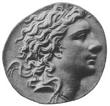
-120 The 165th Oympiad. Mithridates V Euergetes (d. -150) dies, and his son Mithridates VI the Great Eupator Dionysius (-135 to -63) becomes king of Pontus (until -63), with his mother Gespepyris as regent and real ruler (until -115). The Germanic Teutones (Teutoni) ("thiuda" = nation) tribe at the mouth of the Elbe River joins the Germanic (Celtic?) Cimbri tribe, who live in Chersonesus Cimbraica (Jutland Peninsula), and together they begin migrating S into Gaul. Mas'udu becomes king of Lihyan in N Arabia (until -100). Milestones are first used in the Roman Empire. Roman consuls: Gaius Papirius Carbo and Publius Manilius. Births: Roman statesman-gen. Marcus Aemilius Lepidus Senior (d. -77); father of Marcus Aemilius Lepidus Junior (-89 to -13) and Lucius Aemilius Lepidus Paullus. Roman corrupt praetor Gaius Verres (d. -43). Deaths: Green astronomer Hipparchus of Nicaea (b. -190) in Rhodes, Greece. Greek king of Pontus Mithridates V Euergetes (b. -150).
-119 Roman consuls: Lucius Aurelius Cotta and Lucius Caecilius Metullus Dematicus.
-118 Roman consuls: Quintus Marcius Rex and Marcus Porcius Cato Minor. Critolaus the Peripatetic (b. -200) dies, and Diodorus of Tyre and/or Erymneus become heads of the Peripatetic Lyceum in Athens, after which Roman influence pollutes it and the other Greek philosophical schools into becoming eclectic. Architecture: The Via Domitia connecting Rome to its Spanish provinces over the Col de Montgenevre Pass in the Alps is built by Gnaeus Domitius Ahenobarbus. Births: Roman historian (most learned man in Rome) Marcus Terentius Varro (d. -27) near Reate (modern-day Rieti). Deaths: Greek historian Polybius (b. -203). Greek philosopher Critolaus the Peripatetic (b. -200).
-117 Roman consuls: Lucius Caecilius Metellus Diadematus and Quintus Mucius Scaevola. Births: Egyptian king (-80 to -58, -55 to -51) Ptolemy XII Auletes ("the Flutist") Nothos ("the Bastard) (Ptolemy Neos Dionysos Theos Philopator Theos Philadelphos) (d. -51); son of Ptolemy IX Soter II and Cleopatra IV; father of Ptolemy XIII (-61 to -44) and Liz, er, Cleopatra VII (-69 to -30). Deaths: Chinese writer Sima Xiangru (b. -179). Chinese gen. Huo Qubing (b. -117) (plague).


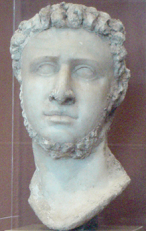
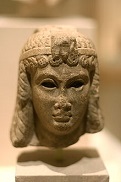

-116 The 166th Olympiad. Antiochus VIII Grypus is deposed and exiled by his maternal half-brother Antiochus IX Eusebes ("the Pious") Cyzicenus ("from Cyzicus"), son of Cleopatra Theo and Antiochus VII, who returns from exile in Cyzicus. Ptolemy VIII Physcon dies, leaving his power to Cleopatra III and any of his sons she might prefer, leaving Cyrene separately to his son Apion, and Cyprus to his son Ptolemy X Alexander I (-107 to -88), who vies for the throne with his other son Ptolemy IX Soter II Lathyrus (Lat. "chick pea") (d. -81); Cleopatra III expels Ptolemy X, and Ptolemy IX becomes king #9 of Egypt's 32nd (Ptolemaic) Dynasty as her co-regent; he marries his sister Cleopatra IV (-138 to -112), but mommy disapproves and replaces her next year with younger sister Cleopatra Selene I (-135 to -69) - kissy and scratchy, I like that? Cappadocian nobleman Gordius murders Ariarathes VI of Cappadocia at the orders of Mithridates VI of Pontus, after which his sister (Ariarathes VI's widow) Laodice rules until Nicomedes III of Bithynia seizes it and marries her, after which Mithradates expels him and restores Ariarathes VI's son Ariarathes VII Philometor ("mother-loving") (d. -101) to the throne of Cappadocia (until -101), with Laodice as regent. Julius Caesar's future uncle Gaius Marius (-157 to -86), son of a small pleb farmer near Arpinum works his way up to gov. of Farther (S) Spain, stopping bandits and becoming rich through mining investments - the Spanish learn the lesson well when they get to the New World? Roman consuls: Quintus Fabius Maximus Eburnus and Gaius Licinius Geta.
-115 Roman consuls: Marcus Aemilius Scaurus and Marcus Caecilius Metllus. Roman consul Marcus Aemilius Scaurus passes yet another sumptuary law to control extravagance - ah, we give up? The Roman census gives the pop. of the Roman Empire as 394,336. Mithridates V of Pontus deposes and imprisons his mother Gespaepyris, and kills off his brothers and marries his sister Laodice, making him a player in the struggle for power in Anatolia (Asia Minor) and the Black Sea, subjugating Colchis then taking on the Scythians under king Palacus, gaining the allegiance of Tauric Chersonesus and the Bosporan Kingdom in the Crimea in return for protection. About this year the flourishing Himyarite (Homerite) tribe of Yemen begins conquering all of S Arabia, moving the capital from Ma'rib to Zafar ("victory") (Redan) by 270 C.E., followed in 537 C.E. by Sana'a; sometime before 522 C.E. the last Yemenite king of Himyar (Homer) visits the oasis in Yathrib (Medina), and they kill his son, pissing him off and causing him to threaten to massacre the pop. and worse, cut down their palms, until two rabbis from the Jewish Banu Qurayza tribe come out and warn him that the town will one day be the home of the prophet of the Arab Quraysh tribe, converting him to Judaism, after which the rabbis do miracles in front of the Yemenis, converting them too; for some strange reason the rabbis recognize the Qaaba as built by Abraham, advising the Yemenis to circle it with shaved heads?; in 25 B.C.E. the Himyarites conquer neighboring Saba' (Sheba), followed in 200 C.E. by Qataban, in 280 C.E. by the Sabaeans, and in 300 C.E. by Hadramaut - sounds like Muslim fake history backdated after their takeover? The Chinese army crosses the Lop Nor dessert, occupies the Tarim basin, and imposes Chinese authority on local rulers. Births: Roman politician, military leader and richest man in Rome Marcus Licinius Crassus (d. -53) becomes rich by setting up the first fire dept. in Rome, which, because he's a Roman aristocrat, is only for putting out fires on his own property; arriving during a fire, he finds the panicked owner standing in front of his villa, and offers to buy it at fire sale prices, then puts out the fire using blankets soaked in vinegar, and fixes it up using his own crew of workers; when he really gets going he runs around to each neighbor and tells him how his villa is about to burn down, and picks them all up for a song too; he uses the money to buy political power, floating interest-free loans and leaning on the debtors for votes - the original Sir Laurence Olivier, greatest actor of his generation? Deaths: Roman gen. Quintus Caecilius Metellus Macedonicus (b. -210). Roman politician Publius Mucius Scaevola (b. ?); brother of Publius Licinius Crassus Dives Mucianus (-180 to -130).
-114 Roman consuls: Manius Acilius Balbus and Gaius Porcius Cato. Births: Roman orator Quintus Hortensius Hortalus (d. -50); known for his perfect memory, his widely-aped way of folding his toga, and his vast wealth and luxurious lifestyle; first to introduce peacocks as a table delicacy in Rome.

-113 Jugurtha (-160 to -104) usurps the throne of the Berber kingdom of Numidia in N Africa (until -104), sacking the capital city of Cirta, pissing-off Rome, which considered the monarchy a loyal ally since the Punic Wars. Ahnuld's ancestors are on the move? The Germanic Cimbri tribe flees Jutland after devastating storms, and reaches Celtic-run Noricum (Carinthia) in modern-day S Austria, coming into first contact with the Romans and winning several Vs, starting a long war allied with the Germanic (Celtic?) Teutons (Teuutones) and Ambrones (ends -101). Roman consuls: Gnaeus Papirius Carbo and Gaius Caecilius Metellus Caprarius.
-112 The 167th Olympiad. Rome declares war on Numidian king Jugurtha, starting the Jugurthine War (ends -106). Damascus falls to Seleucid king (since -116) Antiochus IX Cyzicenus (until 150 C.E.). The Getae of the N Danube River join the Celts to invade Roman possessions in the Balkans. Tripoli in Phoenicia gains the right to mint its own coins. Roman consuls: Lucius Calpurnius Piso Caesoninus and Marcus Livius Drusus.
-111 Antiochus VIII returns from exile, and divides the kingdom with Antiochus IX. The Agrarian Law is passed by the Roman Senate, recognizing that some lands are public while confirming the private land rights of many large landowners. China conquers Nam Viet AKA Viet Nam, ending the Trieu Dynasty (begun -208), and renaming the country Giao-Chi (Jiaozhi), ruling Vietnam for 1K years (until 938 C.E.). Roman consuls: Publius Cornelius Scipio Nasica Serapio and Lucius Calpurnius Bestia.
-110 Roman consuls: Spurius Postumius Albinus and Marcus Minucius Rufus. After claiming that he tried to kill her, Cleopatra III deposes her son Ptolemy IX Lathyrus and replaces him with Ptolemy X Alexander I, but grows tired of him and reverses the choice next year, then reverses the choice again in -107. The Jewish Himyarite Kingdom of Saba in Yemen is founded (ends 525 C.E.). Births: Jewish Pharisee sage Hillel (Heb. "greatly praised") the Elder (d. 10) in Babylon; direct descendant of King David; moves to Jerusalem around -70, spending 40 years in study, then becoming spiritual head of the Jewish people; father of Simeon (Shimon) ben Hillel; grandfather of Gamaliel the Elder (d. 52); great-grandfather of Simeon ben Gamaliel (-10 to 70). Roman Gen. Marcus Petreius (d. 46). Deaths: Chinese historian Sima Tan (b. -165) in Luoyang.

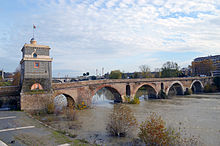
-109 Roman consuls: Quintus Caecilius Metellus Numidicus and Marcus Junius Silanus. Roman consul Quintus Caecilius Metellus Numidicus (-160 to -91) takes experienced military man Gaius Marius (-157 to -86) with him as his legate in his campaign against Jugurtha of Numidia, only to forcibly recalled in -197 by the actions of Marius, becoming his bitter enemy; Numidicus is accompanied to Numidia by his son Quintus Caeciliius Metellus Pius (-130 to -63); the Gracchian Period in Rome ends, and the Marius-Sula Period begins (ends -80). Aemilius Scaurus (-163 to -88) becomes Roman censor, building the Via Aemilia Scauri connecting Placentia, Genoa and Pisa; after the wooden version was built in 206 B.C.E. by consul Gaius Claudius Nero to celebrate the defeat of the Carthaginian army in the Battle of the Metaurus, Scaurus builds the stone Milvian Bridge (Ponte Milvio) across the Tiber River N of Rome; in 63 B.C.E. letters from the Cataline conspirators are intercepted here, allowing Cicero to read them to the Roman Senate the next day and blow their conspiracy; on Oct. 28, 312 C.E. Roman emperor Constantine I defeats his rival Maxentius in the Battle of the Milvian Bridge. Nonfiction: Sima Qian (-145 to -85), Records of the Grand Scribe (130 vols.) (-109 to -91); first universal history of China, covering from the Yellow Emperor to his time. Deaths: Greek Stoic philosopher Panaetius of Rhodes (b. -185).
-108 The 168th Olympiad. China conquers Korea. Roman consuls: Servius Sulpicius Galba and Lucius Hortensius. Births: Roman politician Lucius Sergius Catilina (AKA Catiline) (d. -62).

-107 Roman consuls: Lucius Cassius Longinus and Gaius Marius. The Helvetii cross the Jura Mts. after hearing reports of gold and plunder available in S Gaul and Rome, and defeat a Roman army. Roman statesman-gen. Gaius Marius (-157 to -86) becomes consul, enacting the Marian Reforms, reorganizing legions into separate cohors with landless citizens eligible for military service, and introducing Marius' mules,forked sticks he issues to his soldiers to carry their 50-60 lb. equipment packs in an effort to reduce the size of baggage trains, decreeing that the eagle will be the symbol of the Senate and people of Rome, allegedly because he found an eagle's nest with seven chicks in it as a teenie, predicting that he will be elected consul 7x, going on to become known as "the third founder of Rome". Durstus (d. -98) becomes king of Scotland.
-106 Roman consuls: Quintus Servilius Caepio and Gaeius Atilius Serranus. Tolosa (modern-day Toulouse) in Gaul, home of the Volcae Tectosages is raided by the Romans under Quintius Servilius Caepio, who pillage its temple before the Cimbri rout them, causing the proverb "Habet aurum Tolosanum" to be coined, referring to ill-gotten gains. Gaius Marius establishes the aquila (eagle) as the sole symbol of a Roman legion - how much did he save by switching to Geico? Births: Roman #1 gen and triumvir Gnaeus Pompeius Magnus (Pompey the Great) (d. -48) on Sept. 29 in Rome; father of Gnaeus Pompeius the Younger (-75 to -45) and Sextus Pompeius (-67 to -35). Roman politician-orator and eclectic (Stoic-Skeptic-Peripatetic) philosopher Marcus Tullius Cicero (Lat. "chickpea") (d. -43) on Jan. 3 in Arpinum; brother of Quintus Tullius Cicero (-102 to -43); born into a non-aristocratic family, he uses his brains and talent for oratory to achieve piece-of-the-pie imperium?
-105 Roman consuls: Publius Rutilius Rufus (-158 to -77) and Gnaeus Mallius Maximus. On Oct. 6 the Germanic Cimbri and Teutones wipe out two Roman consular armies at the Battle of Arausio (Orange) on the Rhone River, and remain in Gaul (until -102); after losing his sons in the battle, consul Gnaeus Mallius Maximus is impeached and placed under an "aquae et ignis interdictio" (denial of water and fire), and banished from Rome. Gaius Marius, assisted by Sulla defeats the Numidians after Jugurtha's father-in-law Bocchus I of Mauritania (land of the Mauri or Moors, in NW Africa) betrays him; Jugurtha is captured, paraded in Rome, and executed next year. Tripolis in Phoenicia is granted autonomy (until -64). Births: Roman mime writer Decimus Laberius (d. -43). Galatian Celtic king Deiotarus ("Divine Bull") I (d. -40). Indian king (legendary?) Vikramaditya (d. 15) in Ujjain. Greek historian Lucius Cornelius Alexander Polyhistor (of Miletus) (d. ?) in Miletus; taken POW by Lucius Cornelius Sulla, sold to Cornelius Lentulus, then freed, moving into a house in Laurentum, where he works so hard and so seldom leaves that it finally burns down, taking him with it?


-104 The 169th Olympiad. Roman consuls: Gaius Flavius Fimbria and Gaius Marius. Gaius Marius is elected consul for five years to combat the German threat. John Hyrcanus I dies after switching from the Pharisees to the Sadduccees, and is succeeded as Jewish high priest by his son Judah Aristobulus I (d. -103), becoming the first to take the title of king of the Jews who is not a descendant of David. UFOs are observed in Ameria (Amelia) and Tuder (Todi) in Umbria, Italy. Princess Tou Wan (Douwan) dies, and joins her husband Prince Liu Sheng (d. -141) in her own 208-piece jade suit, which is discovered in 1968; the immortality thing doesn't work, and she crumbles to dust? Architecture: A canal linking Arles to the Mediterranean Sea is built by the Romans. Deaths: African Numidian king Jugurtha (b. -160) in Rome (executed).
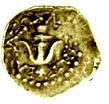

-103 Aristobulus I dies, and his brother Alexander Jannaeus (Jannai/Yannai) (nee Jonathan Alexander) (-126 to -76) succeeds him as Hasmonean king #2 of Judea (until -76), becoming the first to rule as high priest (until -78) as well as king; he offends the Pharisees by being pro-Hellene - and the Pharisees offend Jesus Christ by being pro-Roman? Rabbel I dies, and Aretas II (d. -96) becomes king of the Nabataeans (d. -96). The Cimbri ally with the Teutones again and decide to invade N Italy. Roman consul-gen. Gaius Marius builds a canal connecting the town of Arelas (Arelate) (Arles) in SE Gaul on the left bank of the Rhone River 45 mi. NW of Massilia (Marseille) to the sea, causing it to become a major trading center for the commerce of Gaul, eventually being settled by some of Caesar's legions and going on to pass Marseille and become the #2 wealthiest Roman city after Rome. Roman consuls: Lucius Aurelius Orestes and Gaius Marius. Deaths: Roman satirist (first) Gaius Lucilius (b. -180); leaves 30 books of Satires (Sermones) ("Conversations"), of which 1.3K framentary lines survive, and puts the Romans on their cloud of using trenchant invective, anecdote, dialogue, and fable forms to do as they say, not as they do?


-102 Roman consuls: Quintus Lutatius Catulus (d. -87) and Gaius Marius (-/157 to -86). Early in the year after driving them out of the Alps and causing them to retreat and make a stand on the far bank of the Adige River on the plain, the Cimbri defeat 20K Romans under Quintus Lutatius Catulus in the Battle of the Adige (Atiso) River Valley, after which the Cimbri capture their fort and admire Roman bravery so much that they let them go after taking an oath on a bronze bull and/or escape on their own and capture the bull as a prize, after which Catulus retreats to Rome before setting up another defensive position S of the Po River, while the Cimbri sack Venetia, with Cisalpine Gaul lost to Rome; meanwhile the Romans under consul-gen. Gaius Marius (-157 to -86) defeat and annihilate the Teutones and E Germanic Scirians (Scirii) ("pure-bloods") at the Battle of Aquae Sextiae (Aix-en-Provence) in Gaul (modern-day Aix-en-Provence), and Marius returns to Rome sans his army after hearing of Catulus' defeat, declining to celebrate a triumph; the Romans are surprised to see (naked?) Celtic women, almost as tall as the men, fighting fiercely alongside them - did they show off their bodacious tatas and fur patches? The Han Chinese under emperor Han Wu Di siege and capture Kokand in E Uzbekistan at the SE end of the Ferghana Valley from the Dayuan (Ta-Yuan). Births: Roman gen. Quintus Tullius Cicero (d. -43) in Arpinum (600 mi. SE of Rome); brother of Marcus Tullius Cicero (-106 to -43).
-101 Ptolemy X Alexander I murders his mother Cleopatra III and rules Egypt alone (until -88). Gaius Marius gains his 5th consulship, then with proconsul Quintus Lutatius Catulus defeats the Germanic Cimbri at the Battle of Vercellae (modern-day Vercelli) on the Raudine Plain in Cisalpine Gaul (N Italy); seeing the battle lost, the women kill their children and commit suicide rather than end up as Roman slaves, which doesn't prevent the Romans from killing 140K and capturing 60K incl. many women and children, many of whom join Spartacus in the Third Servile War of -73 to -71; the remaining descendants of the Cimbri and Teutones become the Audatici of Belgium, according to Julius Caesar. After Ariarathes VII gets pissed-off at his father's assassin Gordius, the latter's ally Mithridates VI of Pontus has him assassinated and replaced as king of Cappadocia by his 8-y.-o. son Ariarathes IX Eusebes Philopator (-117 to -89), with guess-who Gordius as regent; meanwhile the nobles of Cappadocia strike back and overthrow him, replacing him with Ariarathes VII's son Ariarathes VIII Epiphanes (until -96). Roman consuls: Manius Aquilius and Gaius Marius.